What Do Travel Percentages Mean in a Job Description?
Written by Nathan Brunner .
Last updated on December 12, 2023.
“Travel percentages” refer to the amount of time that an employee is required to travel as part of their job responsibilities. Travel percentages include traveling to other cities, states, or countries to meet with clients and attend conferences.
For example, if a job description requires “50% travel,” the employee will be required spend roughly half of their time traveling and the other half working from their home office or the company’s headquarters.
Some jobs may require no travel at all, while others may involve extensive travel on a regular basis. Before accepting a job that involves travel, it’s important to carefully consider whether you’re willing and able to meet the job’s travel requirements.
Tip : Find Jobs on Salarship .

The Implications of Travel Percentages on Work-Life Balance
Different travel percentages can have significant implications for work-life balance.
For instance, if a job requires very little or no travel, an employee may be able to maintain a more consistent schedule and have more time for personal activities or family commitments.
On the other hand, frequent or extended travel can lead to fatigue, stress, and a lack of personal time, which can negatively affect an employee’s mental health and well-being .
Here is a quick table to help you understand how the different travel percentages will impact your life once you start your job:
- 10% travel — It means one or two months’ worth of business trips each year. In my experience, it is relatively easy to endure as it means a few travel days (or sometimes weeks) here and there.
- 25% travel — You will spend at least a quarter of your working hours away from your usual place of work. It amounts to 3 months per year, one week per month, or two days per week.
- 50% travel — It means constant overnight or international business trips for at least two weeks per month or six months a year. 50% of travel is usually mentioned in international business job descriptions.
- 75% travel — You will essentially live out of your suitcase and move from hotel to hotel for nine months per year, or three weeks each month. Most jobs that require you to travel three-fourths of the time are pretty stressful (e.g., high-paying jobs or jobs in the transportation industry ). You may rake in a hefty salary, but the tradeoff is little time for yourself, your family, and your non-work-related hobbies and goals.
On the bright side, companies usually shoulder most (if not all) of your travel expenses, including food expenses, hotel expenses, and transportation expenses.
How To Get a Job That Requires You To Travel
If you’re deadset on getting a job that includes a travel percentage in the description, here are a few tips to keep in mind — whether you’re writing your cover letter or answering an interview question on whether you’re willing to travel or not.
- Highlight any previous travel experience you have. You want to reassure your potential employer that you’re not likely to, say, suffer from jet lag, or commit novice mistakes like forgetting to apply for a visa in countries that require them.
- Be honest about the amount of time you’re willing to spend traveling. The more honest you are about what you want at the job application or interview stage, the more likely you’ll end up with a job that’s a good fit for you.
Tip : 1,230,132 Jobs Are Available on Salarship .
Final Thoughts
Evaluating the time you’ll be traveling in a job description can help you decide whether a position is right for you.
On the one hand, traveling often translates to more opportunities for promotion and career growth. On the other hand, traveling can be stressful and take a toll on your physical, mental, and psychological health.
Ultimately, it all boils down to your personal priorities and values.
Similar Articles
- The Meaning of “Clerical Speed And Accuracy” in a Job Description
- What Does “Internal Candidate” Mean When Applying for a Job
Salarship is a job board that focuses on low-competition jobs.
Our office is at Chemin du Valon 20, Sierre, Valais, Switzerland.
For Job Seekers
For Employers
Quick Links
Interview Questions
Comprehensive Interview Guide: 60+ Professions Explored in Detail
How to Answer “Are You Willing to Travel?” (Interview Question)
By Biron Clark
Published: December 5, 2023
If a job involves any travel, you’re likely to hear interview questions like, “Are you willing to travel?” “How much are you willing to travel?” etc.
So in this article, I’m going to walk you through how to answer all of these interview questions. And we’ll look at how to understand the meaning of “travel percentage,” so you’ll know what the job is really going to require before you say “yes” or “no.”
And finally, I’m going to share multiple word-for-word example answers to help you get confident and comfortable with this type of question. So make sure you read until the end.
Let’s get started…
Answers to “How Much Are You Willing to Travel?”
If they ask an open-ended interview question like this about your willingness to travel, you should state your answer as a percentage.
For example, you could say:
“I’m willing to travel up to 30% of the time. That’s what I did in my last job, and I know I’m comfortable with that amount.”
They may ask you directly for a percentage, with a question like, “what percentage are you willing to travel?” and you’d answer that in the same way. What does travel percentage mean, though? If you’re not sure, it’s essential to understand. So let’s discuss the meaning of “travel percentage.”
Travel percentage meaning: What is travel percentage?
So what does 70 percent travel mean? It means that the employer expects you to be traveling or in cities other than your home city for 70 percent of your working days. So you would expect to spend seven days traveling or away from home for every three days in your home town/office.
This is a very high amount of travel. In my experience working as a recruiter , most travel jobs are 50% or below, because this is less stressful and more sustainable for the worker. So, this is something to keep in mind when deciding how much you’re willing to travel, and whether you’ll take or decline the job offer .
How to Answer, “Are You Willing to Travel X Amount?” – Examples
The hiring manager may also come out and tell you how much travel is involved, and then ask an interview question to determine if this is an acceptable travel amount. In this case, if it’s acceptable to you, then you can indicate that you are on-board with what they’re proposing. For example, you could say:
“That amount of travel will work for me. In my last company, I traveled that same amount, and it worked out fine.”
(It’s always good to show you’ve done something successfully in the past. This is the best way to improve to a new employer that you’ll be successful with them, too!)
No worries if you haven’t traveled for a job before, though…
Here’s an example of how you could still answer this question:
“That amount of travel sounds acceptable to me. I have no problem doing that for this role.”
Here’s another example:
“That sounds acceptable to me. I’d love to hear more about the role, and if it’s a good fit, then I am able to travel.”
Make Sure You Know What You’re Agreeing To
Another thing to keep in mind is the actual travel schedule. Two jobs could both have the same travel percentage – let’s say 50%. But one could have you spending two weeks away and then two weeks at home, while the other could have you traveling for 2-3 days at a time, returning, and doing it all again a few days later.
Depending on your family, children, etc., you may be able to handle one of these travel requirements but not the other. So the travel duration and schedule are two factors you should clarify before answering. You can say, “I would like to understand the company travel schedule a bit better. Can you give me an example of how long each trip would be, or what a typical month looks like?” This will help you get a clear picture of what your work schedule would look like before you answer the interview question. So don’t be afraid to ask questions of your own. You can’t answer interview questions like, “Are you willing to travel for this job?” without knowing what the company expects! For example, if they ask, “Can you travel if the job requires it?” you’d want to respond by saying, “How much travel is expected in the role?” You can’t give a good answer without knowing what they’re proposing or asking, so clarify that first. Once you know what the company expects, then it’s time to directly answer their question and indicate whether you can travel the amount they require.
You Can Also Try to Negotiate Your Travel Percentage/Willingness to Travel
If you’re interested in the job but can’t travel quite as much as they’re proposing, you can say:
“I don’t think I can travel quite that amount. The job and work sound interesting, and I’d love to consider the position if the travel requirements can be reduced to 30%”.
This may work, or it may not (depending on the role and company’s flexibility), but it’s worth asking! This way, you’ll find out the best they can do! You never know if they’re asking, “How much are you willing to travel?” because it’s a hard requirement, or if they’re just wondering how much you’re willing to do So give an honest answer and don’t be afraid to make a counter-proposal.
A lot of job seekers are afraid to set limits or “push back” in a job interview, but this can actually make you more attractive to the company. It shows confidence! However, you also don’t want to rule yourself out in an interview. So if you’re not quite sure, but think it’s possible to travel the amount that the company would like, just say “yes” for now. You’re not accepting the job or signing a contract. You’re just indicating whether this might be possible for you. And your goal in any interview is to get invited to the next step in the process… or get a job offer. So if you think it’s even remotely possible to travel the amount they want, then yes “Yes” and keep interviewing!
You can always go home and talk to friends and family and make a better decision about whether this is right for you! You do NOT need to decide this in the interview!
How to Answer, “Are You Willing to Travel or Relocate?” – Examples
This is a slightly different question. But just like with the questions and sample answers above, you should give an honest, upfront answer. There’s no sense in wasting their time if you absolutely cannot relocate. But if it’s even slightly possible, say “Yes” when an employer asks if you’re willing to relocate. Don’t rule yourself out.
Remember: Your goal in the interview is to impress them and get invited back to the next round – so keep going with the job interview, and ask questions to learn more as you go! You’re NOT wasting the recruiter’s or hiring manager’s time by exploring the opportunity, as long as there’s a tiny chance you’d be willing to travel or relocate for the job. They want the opportunity to sell you on their position! I can’t stress this enough: You’re not wasting their time. I hear a lot of job seekers bring up concerns about this, so I just wanted to set the record straight!
You should now know what travel percentage is, and how to answer any time an employer asks about what percentage you’re willing to travel.
Remember – you’re not signing a contract or agreeing to anything in writing; you’re merely indicating whether this could potentially work (for the right opportunity). So stay calm, use the sample answers above, and be direct/concise when responding in a job interview.
This isn’t one of those interview questions where the hiring manager needs to hear a long-winded answer. So once you’ve answered the question, stop and let the interviewer move on!

About the Author
Read more articles by Biron Clark
Continue Reading
12 Expert-Approved Responses to ‘What Makes You Unique?’ in Job Interviews
15 most common pharmacist interview questions and answers, 15 most common paralegal interview questions and answers, top 30+ funny interview questions and answers, 60 hardest interview questions and answers, 100+ best ice breaker questions to ask candidates, top 20 situational interview questions (& sample answers), 15 most common physical therapist interview questions and answers.
- Skip to primary navigation
- Skip to main content
- Skip to primary sidebar
- Skip to footer
Career Sherpa
Guide for Lifetime Career Navigation
- Search this site...
Answering “What Percentage Are You Willing To Travel?”
September 14, 2023 by Hannah Morgan
Talking about what percentage of time you’re willing to travel for work is something that trips up a lot of applicants. They often say what they think an interviewer wants to hear instead of an honest and well-prepared answer.

This guide will help you understand what interviewers are looking for when they ask this question, and how you can develop a response that works for everyone.
Table of contents
What does travel percentage mean, how to answer “are you willing to travel”, example answers.
- placeholder
When a position requires travel, employers typically discuss how much time you’d have to spend in cities other than your own in terms of percentages. For example, a company may advertise a position as requiring “50 percent travel.”
In that case, it means that the employer wants the person hired for that position to spend half of their working days traveling. For every ten days of work, you’d spend five traveling between cities or working in an area outside your home city.
Most travel jobs have a percentage of 50 percent or lower. But you can easily find positions that require more. For example, some engineering, training. and sales jobs have workers traveling 70 percent of the time! Some companies even offer positions that require 100 percent travel time.
It all depends on the industry and the unique position you’re applying for.
Understanding what a company means by “travel percentage” is important to grasp what an employer wants from a new hire. Travel jobs can be fun, but they’re also demanding. You’ll need to spend time away from your family and friends, and the lifestyle is much different than a standard nine-to-five.
While not always the case, many travel percentage requirements are negotiable. A question like this opens the door to that, giving hiring managers a better idea of what you can realistically do if hired.
Many job seekers fear answering a question like this because they believe that interviewers have something specific they want to hear. However, you can still be honest and set limits without hurting your chances of getting further into the hiring process.
Here are some tips on how to answer this question the right way.
1. Decide What You Want Ahead of Time
The most important thing you need to do is decide how much you’re willing to travel before you head into the interview. Nothing will ruin your chances faster than interviewing for a position that requires traveling, and saying you can’t travel at all (or aren’t sure how much you’re willing to travel). You likely won’t be in the running at all if that’s the case.
Do your research and read the job description closely. Employers are usually upfront about travel expectations. Travel percentages can be negotiable, but do note if the job posting mentions travel, some travel will be required.
Know what you want before you head into the interview. Think about how much travel you can do and how that might affect your life moving forward. Then, have a general travel percentage in mind.
Deciding how much you’re willing to travel will give you everything you need to answer this question confidently.
Interviewers don’t want wishy-washy answers or the dreaded “I don’t know.” If you want to sound confident and serious about this position, know what you want before your meeting.
It’s also important to look into how travel is structured for each position. While companies discuss travel time in percentages, that doesn’t necessarily mean you’ll spend X amount of days on the road and X amount of days in an office in your home city.
Some positions require you to travel several weeks at a time before spending a few weeks off at home. Those trips could be regular or sporadic based on the company’s needs.
Understand what you’re getting into and what the job requires. Do your research to avoid any surprises!
2. Be Honest & Clear
Contrary to popular belief, you don’t need to say that you’ll do whatever the company wants in order to get a job.
Travel is a big commitment. Employers and hiring managers know that. They understand that considerable travel is not for everyone, so they appreciate the honesty.
Be clear about whether you’re willing to travel most of the time or can only be on the road a few days out of the month. Be honest and set your boundaries.
The last thing any hiring manager wants to hear is a vague answer. Your response is important because it directly impacts your fit for the job. For example, some companies might have hard travel requirements that are non-negotiable. In those cases, they need a firm confirmation that you can or cannot meet their required travel percentage. Otherwise, you’d waste their time and yours moving forward. That’s why you should consider what you want from your job before the interview.
Be honest and clear. Don’t lie because you think it might increase your chances of getting a job. While lying might help you move further into the hiring process, it won’t do any good when you can’t hit the road once hired.
The best scenario is already knowing what travel percentage you can work. Discuss those limits during your interview. But you can also express interest in negotiations.
You can tell the interviewer you’re willing to travel but want to learn more about the other job expectations. While not as ideal as providing a percentage, that’s usually enough for interviewers to proceed. Interviews aren’t job offers, and you’re not signing contracts at that point.
So, there’s still room for further discussion. The most important thing is that you’re upfront and have some idea of what you can do going into the interview.
3. Show That You Understand How Travel Relates to the Job
Another important thing to do when answering this question is to demonstrate that you understand the job.
Travel jobs are appealing to many people. One concern that many hiring managers have is that applicants try to get the job because they simply think it’s a cool way to see new places. While that can be true for some jobs, you’re not getting hired to explore new cities and go on vacation!
It’s still a job, and you’ll have important responsibilities.
Show that you understand the job and are there for the right reasons. One way to do that is by talking about some of the unique responsibilities of the job or demonstrating that you know how important travel is for this position.
For example, you can connect the reason why this job requires travel to your work. If the job revolves around sales, you can mention that you understand that traveling is crucial to gaining more clients across the state. If it’s a consulting job, you can discuss how traveling to companies allows you to better assess the situation and build better connections inside companies.
This seemingly small detail makes a difference. It shows that you’re seeking this job for the right reasons and are committed to doing a fantastic job.
4. Highlight the Positives
Finally, highlight some of the positive aspects of travel. That doesn’t mean you should lean too heavily on wanting to get out and explore. Remember: You still have a job and must demonstrate your commitment to doing it.
However, mentioning some of the things you love about jobs that require frequent travel can reassure hiring managers that you’re up for the challenge. An example of this could be networking and meeting new people in a professional setting.
Travel jobs can be overwhelming for some people. It can lead to burnout, and many employers struggle with low retention rates for these positions.
The ultimate goal for hiring managers is to find someone who thrives in a job that requires traveling. The best people are those who love getting on the road and don’t mind some of the common pitfalls of being in a new place and spending time away from friends and family.
If you show this job will be a positive experience, hiring managers may put your application at the top of the stack.
Connect your past experiences to what you hope to gain from this new job. For example, you can refer to how great previous travel jobs were for you. If you don’t have any related work experience, you can mention times when you studied abroad or spent significant time on the road.
Focus on your love of new experiences and highlight all the great things you’ll gain from this job.
There are many ways to answer “Are you willing to travel?” and how you respond depends on your needs. But these examples will give you a good idea of the type of answers that interviewers love to hear.
In the first example, we have a candidate with some experience traveling in a previous job. They leverage that work experience to reassure the interviewer that they can handle the responsibilities.
“I am willing to travel for work. I traveled about 40 percent of the time in my last job. I’m prepared to do the same here because I know I’m comfortable with that amount of time on the road. I’ve learned how to manage and succeed despite the time away from home. In my last job, I’d spend weeks traveling to cities across the eastern seaboard. I got to work with great people in cities I enjoyed plus I found time to explore many beautiful states. I’m excited at the chance to do the same here while working to fulfill your company’s objectives.”
Our next example is straightforward. The candidate demonstrates that they understand the company’s expectations and use their previous experience to reassure the interviewer that they’re up for the task.
“I’m definitely willing to travel. In my last sales job, I spent about half my time on the road while traveling to cities around the state. It was a great experience, and I had no trouble getting comfortable doing it. The roughly 30 percent travel percentage mentioned in the job posting sounds more than acceptable to me. I have questions about the frequency and the average length of business trips, but I’m certainly willing to spend time traveling.”
Our final example comes from a candidate who has no travel experience. However, they go into the interview knowing what they want and provide a confident answer, demonstrating their understanding and willingness to work hard.
“I’m more than willing to travel; I’m looking forward to it. Not only do I enjoy working with new people, I also like the excitement of traveling to new places. Your job posting mentioned that the position will require at least 50 percent travel time. I can travel as much as 75 percent if the job requires that. I know that your company has offices across the western United States. As a trainer, I understand that visiting those offices and working with people directly makes a big difference in their success. I’m eager to get my hands dirty and do what I can to help others while improving the collective expertise of this company’s employees.”
As you can see, spending some time thinking about the percentage of time you’re willing to travel is just part of the equation. You also need to be honest with the interviewer about what works for you!
If you practice your answer and follow these rules, this question won’t cause you any trouble.

Hannah Morgan speaks and writes about job search and career strategies. She founded CareerSherpa.net to educate professionals on how to maneuver through today’s job search process. Hannah was nominated as a LinkedIn Top Voice in Job Search and Careers and is a regular contributor to US News & World Report. She has been quoted by media outlets, including Forbes, USA Today, Money Magazine, Huffington Post, as well as many other publications. She is also author of The Infographic Resume and co-author of Social Networking for Business Success .

- Interviewing
- Career Management
- Social Media
- Summary Sunday
- Products & Services
NEVER MISS A POST!
Don’t miss out on the latest tips and tricks for a successful job search! By subscribing, you’ll get a weekly digest of modern job hunting trends. Whether you’re just starting your career or looking to take it to the next level, my newsletter has everything you need to succeed. Join the community today and stay ahead of the game!
SIGN UP HERE!
- More Networks
Explore Jobs
- Jobs Near Me
- Remote Jobs
- Full Time Jobs
- Part Time Jobs
- Entry Level Jobs
- Work From Home Jobs
Find Specific Jobs
- $15 Per Hour Jobs
- $20 Per Hour Jobs
- Hiring Immediately Jobs
- High School Jobs
- H1b Visa Jobs
Explore Careers
- Business And Financial
- Architecture And Engineering
- Computer And Mathematical
Explore Professions
- What They Do
- Certifications
- Demographics
Best Companies
- Health Care
- Fortune 500
Explore Companies
- CEO And Executies
- Resume Builder
- Career Advice
- Explore Majors
- Questions And Answers
- Interview Questions
How To Answer “Are You Willing to Travel?” Interview Question (With Examples)
- How To Answer Tell Me About Yourself?
- Elevator Pitch
- Where Do You See Yourself In 5 Years?
- What Are Your Career Goals?
- When Can You Start?
- How Do You Define Success?
- Describe Your Work Ethic
- Where Are Your Current Duties?
- What Are Your Learning Goals?
- Intrinsic Vs Extrinsic Motivation
- What Is Your Desired Salary?
- What Makes You Unique?
- Why Are You The Best Person For This Job?
- Reasons For Termination
- What Are Your Work Values
- How To Make A Hard Decision?
- What Are You Most Proud Of?
- Personal Code Of Ethics
- Problem Solving Interview Questions
- Taking Initiative Example
- How Do You Prioritize Your Work
- Explain Gaps In Employment
- Most Rewarding College Experience
- What Is Your Work Style
- Tell Me About A Time When You Made A Mistake On The Job
- Tell Me About Gaps In Employment
- What Are You Passionate About
- What Skills Would You Bring To The Job
- Who Is Your Mentor?
- How To Answer Tell Me About A Time You Disagreed With Your Boss
- How To Answer Common Screening Questions
- How Do You Handle Stress
- Are You Willing To Travel?
- Situational Interview Questions
- Promotion Interview Questions
- Internal Interview Questions
- Open Ended Interview Questions
- Tough Interview Questions
- Leadership Interview Questions
- Teamwork Interview Questions
- Interview Questions About Communication
- Personality Interview Questions
- Internship Interview Questions
- Ice Breaker Questions
- Recruiter Interview Questions
- Brain Teaser Interview Questions
- Group Interview Questions
- Competency Based Interview Question
- Grad School Interview Questions
- Scrum Interview Questions
- Excel Interview Questions
- Common Phone Interview Questions And Answers
- Why Did You Choose Nursing?
- Why Do You Want To Be A Teacher?
- Why Do You Want To Be A Doctor?
- Why Do You Want To Be A Police Officer?
- Police Officer Interview Questions
- Why Do You Want To Be An Accountant?
- Sales Interview Questions
- Interview Questions For Managers
- Retail Interview Questions
- Teacher Interview Questions
- Accounting Interview Questions
- Teaching Philosophy Examples
- Management Philosophy Examples
- Leadership Philosophy
- What Does Customer Service Mean To You
Find a Job You Really Want In
Summary. To answer, “Are you willing to travel?” in an interview, give an example that demonstrates your willingness to travel and communicate any boundaries or limitations you may have. You should also clarify what the travel expectations would be before accepting the job.
When getting asked if you’re willing to travel for your job, the instinctive response would be to say yes. After all, who wouldn’t want the opportunity to explore a new place on your company’s dime?
Here are a few things to consider before accepting a traveling position:
Key Takeaways:
When answering this question it is important to talk about positive travel experiences, demonstrate a thorough understanding of the job, and talk about networking.
You should avoid lying about your availability, any negative travel experiences, and go overboard when talking about the good experiences.
Before taking the job, it is important to clarify travel percentages, any expenses you may have, and what type of travel it is.

How to Answer “Are You Willing to Travel?”: Dos and Don’ts
Example answers to “are you willing to travel”, what you should ask about travel during your interview, what does “willingness to travel” really mean, are you willing to travel faq, final thoughts.
- Sign Up For More Advice and Jobs
When it comes to actually answering the question when it’s posed to you by a hiring manager, there are a few things you ought to bring up — and some things you should just avoid entirely .
The DO’s:
Talk about positive travel experiences. They’re looking for someone who is comfortable with spending a lot of time away from friends, family, and the home office — you want to do as much as you can to assure them that traveling is something you find invigorating and fun.
So go ahead and bring up that study abroad trip, even if it’s a little out of date.
Demonstrate a thorough understanding of the job. Whatever it is you’re doing, your company won’t just be sending you places so you can eat cool food in new places.
They want you to work, and understanding that you’ll be working regardless of whether you’re traveling is important to be considered for the job.
Bring up the unique job responsibilities of the position as you understand it and explain your commitment to fulfilling them.
Talk about networking . A lot of work in a traveling position requires talking to other human beings and making business connections that stick.
For this reason, it’s important to show hiring managers that you know how to make these kinds of connections by talking about networking experiences you’ve had in the past — and it wouldn’t hurt to engage in a little small talk during the interview itself, either.
The DONT’s:
Lie about your availability. If you can’t travel at all, don’t apply in the first place, but your employer needs to have a realistic understanding of your ability to travel if they’re going to hire you for the position .
So if you can’t do weekends or certain percentages of the week, let the hiring manager know up front.
Focus too heavily on your availability either. Giving a specific maximum amount of travel you’re able to do can look bad as well, especially if that maximum is below the company’s expectations. So tell them your availability, but don’t spend too much time on it.
Bring up negative travel experiences: These are fine to talk about once you have the job, but during the interview process it will just make you look like you associate these experiences with traveling and that you are even perhaps lying about how comfortable you are with traveling.
Go overboard talking about good experiences: As bad as it is to talk about bad experiences, it can be just as damaging if the only good experiences you talk about are vacations or day trips.
After all, they expect you to work while you’re on these trips, so if they think you associate traveling just with vacations and relaxing, they might not have the most faith in your dedication to work.
Yes, I’m absolutely willing to travel. I spent a year studying abroad before graduating last year, and I learned that I love experiencing new places and meeting new people regularly. During my internship at The Coastal Society, I regularly traveled to different coastal sites to meet with marine biologists and gather data. I really enjoyed that aspect of the job, so I’m definitely open to making travel a bigger part of my professional life.
I am certainly willing to travel for work. At my last job in sales, I spent about half my time on the road, so the roughly 25% travel time we discussed for this job sounds more than acceptable. I just have a few more questions about how frequently trips are taken for this position and the typical length of a business trip.
While I’m willing to travel (and love traveling), my spouse works on the weekends and we have three kids at home. As such, I need to keep my weekends free for childcare. But any travel during the workweek I can happily accommodate.
The reasons why the company needs you to travel can vary wildly, and as a result, the particular travel experiences you’ll have could vary even for two similar positions.
It’s important for this reason to figure out exactly what sort of travel the company expects you to undertake before you get too far into the interview process .
A few things you should clarify before you take the job:
Travel percentage. If a job is advertised as having a travel percentage of 20%, that doesn’t necessarily mean that you’re traveling every Friday, or alternatively that you’re only traveling one week of every month.
That 20% is an average , and what it represents can vary dramatically by career, so make sure you ask your hiring manager to tell you exactly what the travel percentage means for the position you’re applying for.
Expenses. Namely, are they paid? How much of your food is being covered? Gas? Other travel expenses?
It’s important to know this beforehand — while many places will reimburse you for every expense you incur while on the road, it’s important to know what the company’s official policy is for travel.
Type of travel. Will it mostly be flying? Will you be expected to drive to the locations you’re going to? Where will you usually be traveling to?
Where would the company prefer that you stay while you’re there? Will you be staying anywhere at all, or are the trips too short for this?
There are two major kinds of travel jobs :
Seasonal jobs. These exist only for a few months or even just a few weeks and may require you to travel for the entirety of the time you’re working the gig.
“Regular” job that require travel. For these kinds of jobs, the amount of traveling that occurs can vary dramatically depending on the position.
Here are a few things that might be expected of you if you enter a job like this, seasonal or not, and some things you should keep in mind before giving your final answer.
You might have to make day trips, but the company may not be willing to pay for you to stay overnight. This could mean long work days punctuated by large amounts of travel which could keep you awake for 16 hours or more.
Alternatively, you might be sent very far away and be expected to fend for yourself once you get there. You may not have much, if any, time to explore this place between takeoffs — you might just be working the entire time.
Relocation should NOT be expected of you unless it’s discussed at this time as well. It’s also important to note that there is a big difference between being willing to travel and being willing to relocate.
What does it mean when a job asks if you’re willing to travel?
When a job asks if you’re willing to travel, it usually means there is at least some travel required for the position. The exact amount will vary, but there will typically be enough for interviewers to find out how well your willingness to travel aligns with the job’s requirements.
How do you put willing to travel on your resume?
You can put willing to travel on your resume by noting how much you traveled at your last position. This will point out to recruiters that you’ve at least been willing to travel in the past and may be willing to again.
If you haven’t had a position that requires travel before, you can note your willingness to travel in your resume summary . This is usually only a best practice if you’re aplying for a job or are in an industry that typically requires travel. Otherwise, it could look out of place and come off as ignorant.
Traveling is often one of the most exciting parts of any job that includes it and, despite the huge amount of work that gets compressed during these trips, it can be very fun if you’re adequately prepared for it.
When it comes to working travel jobs, you really have to be ready to go all in. That’s why it’s so important to understand what a company is asking when they want to know if you can travel.
Not only will it make you look proactive and interested in the position, but it can help keep you from getting in over your head with a situation you’re not comfortable with or ready to undertake.
And whatever you do while you’re out exploring the world, make sure you don’t stray too far from the hiking trail. That’s how you get bear maulings, and those usually aren’t covered under company expenses.
Anyhow, best of luck to you! Here are some other links to help you on your way.
- 3 Tips For Successfully Calling In Sick (Even If You’re Not)
- 13 Job Search Mistakes You Might Not Even Realize You’re Making
- 3 Steps To Reject A Job Offer Without Burning Bridges
Illinois Graduate College – Sample Interview Questions
How useful was this post?
Click on a star to rate it!
Average rating / 5. Vote count:
No votes so far! Be the first to rate this post.

Ryan Morris was a writer for the Zippia Advice blog who tried to make the job process a little more entertaining for all those involved. He obtained his BA and Masters from Appalachian State University.
Recent Job Searches
- Registered Nurse Jobs Resume Location
- Truck Driver Jobs Resume Location
- Call Center Representative Jobs Resume Location
- Customer Service Representative Jobs Resume
- Delivery Driver Jobs Resume Location
- Warehouse Worker Jobs Resume Location
- Account Executive Jobs Resume Location
- Sales Associate Jobs Resume Location
- Licensed Practical Nurse Jobs Resume Location
- Company Driver Jobs Resume
Related posts

How To Make Your Cover Letter Stand Out In 12 Easy Steps

How To Answer “What Is Your Teaching Philosophy?” (With Examples)

3 Tips to Answering the Question “Where Do You See Yourself in 5 Years?”

How to Answer “Why Should We Hire You?”: 3 Big Tips
- Career Advice >
- Get The Job >
- 3 Tips Are You Willing To Travel
- Job Search Advice
- Interviewing
- Login/Register
- Tough Interview Questions
- Tough Interview Question: Are you willing to travel? How much?
Tough Interview Question - Are you willing to travel? How much?
Are you willing to travel? How much?
Similar interview questions: Do you own your own car? Are you willing to use it for business travel? How many nights per week are you willing to be on the road? Is there anywhere in the world where you would not be willing to travel? How much travel have you done in your life? Do you enjoy it?
Why the interviewer is asking this question: Some jobs involve an element of travel. It could be travel to different work locations or it could be travel as part of the job itself, such as travel to different client locations. The interviewer wants to know if you are open to travel and whether you are travel-preferent (some people enjoy the travel component of their work) or travel-tolerant (not necessarily enjoying the travel, but understanding it is a part of the job).
The best approach to answering this question: If you are open to travel, say so and say how much, usually noted as a percentage. Travel can sometimes be difficult to quantify as a percentage, since it usually refers to overnight travel, with each 20% indicating one night of travel per week. So travel done during the day, but returning that evening is technically not counted as business travel, although the travel itself usually is covered as a business expense. Also, 20% travel could mean overnight travel once a week or a full week out of town every 5 weeks or a full month out of town every 5 months. So it’s important to ask for specific examples of what the travel will look like if you are agreeing up front to travel requirements for the role.
An example of how to best answer this question for experienced candidates: "I do have flexibility to travel and have done so in my most recent role, which requires approximately 20% travel. How much travel is required for this role and what are some examples of the travel that would be involved?"
An example of how to best answer this question for entry level candidates: "I have no limitations on my ability to travel for my work and I have done extensive travel to date, including my semester abroad last year. Can you tell me more about the type and scope of travel which may be involved for this role?"
An example of how you should not answer this question: "Well only if I’ve got a big fat expense account to draw from when I travel. Then I don’t mind, since I can pad in all the extra expenses that would make it worthwhile. Would I get to fly first class?"
Further review: know the answers to these Standard Interview Questions to be fully prepared for your interview!
Search for jobs:
Answering “Are You Willing To Travel?” In An Interview (2023)
Want to crush your interview.
Learn how to ace your interview with superior confidence.

When an interviewer asks you, “Are you willing to travel?” you might be a little thrown off by the question at first. But we’re here to help you answer the question in a way that’s going to get you onto the second round of interviews and further your chances of being hired.
In a lot of jobs today, travel is a major part of the role. It can be because they would like you to meet with other colleagues at various offices around the world or country. Or it could be related to the fact that you might be applying for a sales position and that going on location for the sales process is a key part of the role. When the interviewer asks you this question, they are ensuring you both are on the same page related to the job requirements. And travel can be one of those requirements.
Before you interview with a company or position that may require travel, you should ensure that you are personally comfortable with the fact that you may have to commit to this. For example, you may have a family at home. Or children. Before you commit to a certain level of travel, you may want to have discussions with your family or consider what your family needs are before you say “Yes” to your interviewer.
Are you willing to travel
An example answer for when the interviewer asks you if you are comfortable with travel is: “I’m very comfortable with travel being a core part of the job function. In previous roles, this was a requirement. This is something I’m very familiar with, and this shouldn’t be an issue. Can you please let me know what degree of travel the job requires? Or what the standard business travel practices are?”
It is always good to ask the interviewer a question whenever possible. With your question here, this will give you more insight into what the required travel entails. That may give you more information on deciding on the fly as well. For example, if they are asking for you to pay for the business travel through personal expenses. While this is very rare to have happened, you may want to ensure that’s not the case.
If you’d like to go above and beyond related to this interview question, you can give an allotted time for which you are comfortable traveling. For example, you can say: “I’m very comfortable traveling for business. It was part of the job function for previous roles I’ve had. Though I wouldn’t be comfortable traveling more than 35% of the time.” This will help to set some limits on the travel that you’d be comfortable doing. Which is useful in managing the expectations of the interviewer you are speaking with.
Stay enthusiastic, be honest with yourself
At all costs, whenever a question like this is asked, try to stay positive and answer with enthusiasm even when you feel as though you may not feel that enthusiastic. This is because you can always come back to the interviewer at a later date, potentially by email, and ask if there is an opportunity to change some of the requirements like business travel. If you aren’t comfortable with travel, it's advised that you be honest and tell your hiring manager that you aren’t. They will decide whether this is a deal-breaker or not.
What does "percentage of time willing to travel" refer to?
In most circumstances, let's say you are employed full-time. That means you will be working 1,920 hours a year. The percentage of travel is a portion of the total amount of hours or days you are willing to travel. For example, if your employer asks you to travel at least 20% of the time, that means up to 384 hours traveled. Or, in other words, around 16 days out of the year. You must clarify with your employer whether that is including weekends or not. It is okay to say to your employer that you would prefer not to travel for business on weekends.
Helpful tips when speaking about business travel to interviewers
Here's some things you should keep in mind when speaking about business travel:
- Speak in a positive light about being able to travel.
- Ask if the travel is local or international.
- Ask questions to what the travel is for.
- Ask questions related to how the travel expenses are handled.
- Speak highly of the fact that you've had prior business travel experience and feel comfortable doing so.
- Ask what percentage of travel is expected of you. If you don't want to ask that, you can suggest a certain travel percentage you are comfortable with.
Here's what you should not bring up when speaking about business travel:
- Tell the interviewer it will change your mind about the position.
- Speak about negative travel experiences you've had in the past.
- Speak about negative business travel experiences you've had.
- Inquire too heavily about who is going to pay for the expenses. Don't be aggressive about the compensation portion of the question.
- Change your mood and become negative towards the interviewer.

About the author
Patrick Algrim is a Certified Professional Resume Writer (CPRW), NCDA Certified Career Counselor (CCC), and general career expert. Patrick has completed the NACE Coaching Certification Program (CCP). And has been published as a career expert on Forbes , Glassdoor , American Express , Reader's Digest , LiveCareer , Zety , Yahoo , Recruiter.com , SparkHire , SHRM.org , Process.st , FairyGodBoss , HRCI.org , St. Edwards University , NC State University , IBTimes.com , Thrive Global , TMCnet.com , Work It Daily , Workology , Career Guide , MyPerfectResume , College Career Life , The HR Digest , WorkWise , Career Cast , Elite Staffing , Women in HR , All About Careers , Upstart HR , The Street , Monster , The Ladders , Introvert Whisperer , and many more. Find him on LinkedIn .
Fact checked: Our small and dedicated team rigorously evaluates every article, guide, and reference to ensure the information is accurate and factual. Learn more .
Popular Resources

35+ Phone Interview Questions & Best Sample Answers
Phone interviews have become a core part of the process when attempting to find a secured placement for an open position. Companies receive massive responses from potential candidates for any..

12+ Best Questions To Ask A Recruiter
Concerning a job search, you might receive numerous offers from your recruiters. Before you choose one, you need to assess all the conditions, for which it is vital that you know everything associated with the offered position..

Answering "What Makes You Unique" In A Job Interview
Answering this question during a job interview requires more than knowing why you are unique as an individual. Yes, the true scientific answer is made up of two main components: your..

250+ Ice Breaker Questions for Life
An ice breaker question is a question that’s asked from one person to another person in order to act as a conversation starter. It brings a connection...

10 Best Answers to "What Motivates You?"
Open-ended questions like “What motivates you?” can elicit a deer-in-the-headlights reaction from job candidates if they are unprepared. It’s a broad question and can leave the interviewer..

Answering "How Did You Hear About This Position" In An Interview
A lot of interviewers ask this question - how did you hear about this position? This way they can judge you if you are a passive or an active job seeker..

8 Best Thank You Emails After an Interview (Samples, Free Templates)
Writing a thank you note after an interview says a lot about you as a potential employee. Most notably, it says that you care about the opportunities presented..

Writing a Resignation Letter (How To Write It, Samples)
Writing the perfect letter of resignation is more of an art than it is a science. And we’re going to cover how to master that art form in this full guide..

How to End a Letter (Example Salutations, Sign Off's)
Knowing how to end a business note or email is an important skill to develop. It helps portray a sense of confidence, respect and tone to your message..
Help us by spreading the word
- Internships
- All Resources
- Cover Letters
- Job Descriptions
- Interview Questions
- Most popular
- Trivia Questions
- Trivia Questions for Kids
- 555 Meaning
- 333 Angel Number Meaning
- Most Likely To Questions
- Good Pick Up Lines
- Cute Names to Call Your Boyfriend
- Funny Insults
- Paranoia Questions
- 777 Angel Number Meaning
- Bad Pick Up Lines
- Funny Names
© Copyright 2024, algrim.co - Terms & Conditions - Privacy Policy - Illustrations
How many days is 30% travel?
1. how can i better manage my time during travel days, 2. how should i plan my travel itinerary for 30% travel, 3. how can i stay organized while traveling, 4. how can i reduce the stress of frequent travel, 5. how can i make the most of my travel experiences.
When it comes to understanding the duration of 30% travel, it is important to consider that the percentage refers to the portion of time spent away from your primary location, such as home or office. To calculate the number of days, you need to determine the total number of days in the period you are referring to. Let’s take a closer look at how we can calculate the number of days for 30% travel.
Let’s assume you have a total of 30 days in a month, and you need to spend 30% of that time traveling. To calculate the number of days, you can use the following formula:
Number of days = Total number of days x Travel percentage / 100
Using this formula, you can calculate that 30% of 30 days is 9 days. This means that out of the 30 days in a month, you would spend approximately 9 days traveling.
Managing your time effectively during travel days is key to ensuring productivity and minimizing stress. Here are a few tips:
- Prioritize tasks and create a to-do list for the day.
- Make use of travel time by working on tasks that can be done remotely.
- Take advantage of technology to stay organized and connected.
- Utilize travel downtime for self-care, relaxation, or catching up on personal tasks.
By implementing these strategies, you can make the most of your travel days and maintain a productive schedule.
Planning your travel itinerary is essential to ensure smooth and efficient trips. Consider the following:
- Identify key locations or cities you need to visit.
- Research transportation options and book in advance.
- Allocate sufficient time for meetings or conferences.
- Allow for downtime to explore the destination or take care of personal matters.
- Create a detailed schedule to keep track of your activities.
By carefully planning your travel itinerary, you can make the most of your time and maximize efficiency during your trips.
Staying organized is crucial when you are frequently traveling. Here are some tips to help:
- Use packing cubes or organizers to keep your belongings neat and easily accessible.
- Create digital copies of important documents and store them securely.
- Keep a travel checklist to ensure you have everything you need for each trip.
- Utilize mobile apps or digital tools to manage your itineraries, reservations, and expenses.
- Keep a travel bag stocked with essentials, such as chargers, adapters, and toiletries.
By implementing these organization strategies, you can make your travel experiences more efficient and enjoyable.
Frequent travel can be taxing both physically and mentally. Here are some tips to reduce travel-related stress:
- Establish a self-care routine to prioritize your well-being.
- Stay hydrated and maintain a healthy diet while traveling.
- Practice relaxation techniques, such as deep breathing or meditation.
- Stay connected with loved ones for support.
- Take breaks and allow time for rest and rejuvenation.
By taking care of yourself and managing stress effectively, you can navigate the challenges of frequent travel with ease.
Traveling frequently presents unique opportunities for personal and professional growth. Here are some ways to make the most of your travel experiences:
- Immerse yourself in the local culture and explore new cuisines, sights, and activities.
- Network with professionals in your industry during conferences or business trips.
- Take time to learn about the history and customs of the places you visit.
- Document your experiences through photography, journaling, or blogging.
- Embrace the challenges and adapt to different environments.
By approaching travel with an open mind and a thirst for knowledge, you can enrich your experiences and create lasting memories.
About The Author
Mark Barlow
Leave a comment cancel reply.
Your email address will not be published. Required fields are marked *
Save my name, email, and website in this browser for the next time I comment.
How much Travel is 10% Travel in a job description?
You certainly have heard about the 10% Travel or seen it in the job description. What does the 10 percent travel mean, then?
It means that your employer expects you to spend 10 percent of your working days traveling or in cities other than your home city.
10% Travel : How to calculate travel percentage?
- How many days?
But how can one know the exact number of work days they will be spending in other countries or cities away from home?
It is very easy; you only have to do a quick calculation.
For instance, if your employer wants you to be traveling 10 percent of your working days – 260 days yearly on average – then you would expect to leave your office or town for 26 days each year.
- How many weeks?
Therefore, if you happen to work 50 weeks per year and need to go on five business trips per year, each lasting one week (e.g., to visit a client in the context of a project), this accounts for 10%.
- How many hours?
For the most part, let’s assume you work full time. This means that you will work 1,920 hours per year. Travel percentage is a percentage of the total number of hours or days you are willing to spend traveling.
For instance, if your employer requires you to be traveling at least 20% of the time, that would mean up to 384 hours of travel. Put another way, approximately 16 days per year.
You should double-check with your employer to see if this also applies to weekends or not. There is no problem if you tell your employer that you do not want to do any business travel on weekends.
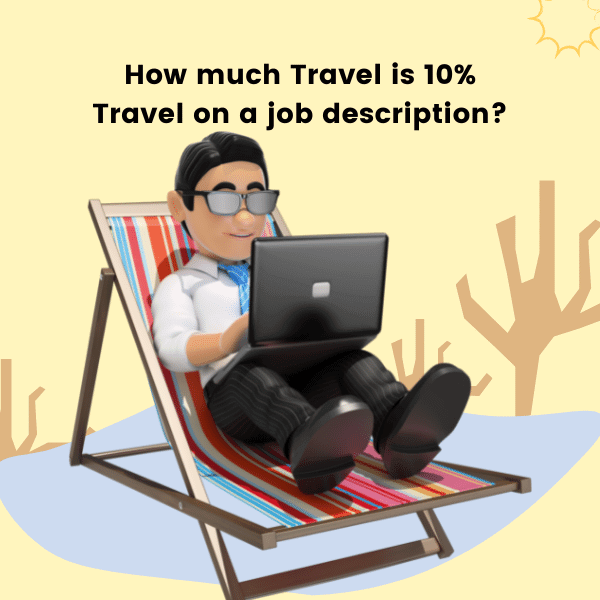
Is 10% travel too much travel?
No Mention Of Drug Tests In A Job Offer : Does that mean no test?
Effects of heavy traveling
Around 30% of working travelers say it is very difficult to stay healthy when they travel for work, and 24% say they are even more likely to get physically ill after a business trip.
Almost half of them don’t sleep enough when they travel for work, based on a new report by business travel management company TravelPerk.
The disruption that business travel causes to routine often leads to unhealthy eating and drinking, as well as a lack of physical activity. In addition, business travel can affect many people’s sleep, which in turn can jeopardize the immune system.
In addition, an estimated 30 percent feel they need to be constantly reachable while traveling for business, and 27 percent have trouble finding time for themselves and relaxing, according to the TravelPerk report.
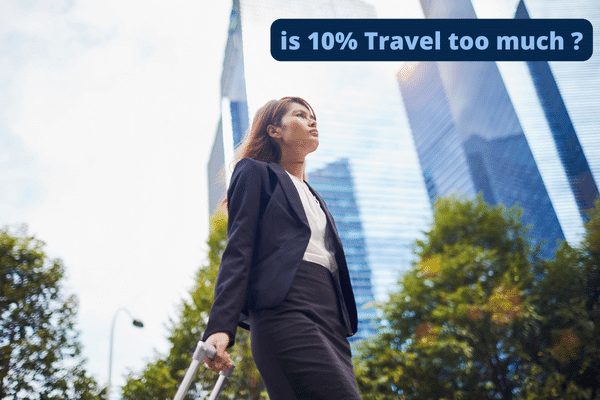
According to a study last year, those who traveled 14 or more nights per month for work – as compared to those who traveled only one to six nights per month – had a higher body mass index and were more prone to symptoms such as anxiety, depression and alcohol dependence, the Harvard Business Review reported.
Meanwhile, those who traveled 21 or more nights per month for work were significantly more likely to be obese and experience higher blood pressure.
Needless to say, each company has very distinctive approaches and needs, so you should initiate the conversation with your employer.
Can “10% Travel” be considered heavy traveling?
Employers often indicate 10% travel time with almost no intention of actually asking it because it’s only required on an occasional basis.
So many people in these positions do not travel for years. But if an employer is actually considering regular travel, you need to find out what kind of frequency they really look for.
For the majority of workers, there is a world of difference between two one-day trips per month compared to a one-week trip per quarter or a five-week trip per year, all of which could reasonably be considered as 10% of travel time.
In a nutshell, 10 percent is a convenient and unproblematic travel rate for workers , which did not cause them any significant difficulties at work and did not affect them on either a personal or professional level.
Read also: When Is It Too Late To Cancel An Interview?
Is business travel compulsory?
The first labor law question arises even before the business trip begins. Is a business trip part of an employee’s duties at all, can the boss simply order the business trip, or can an employee refuse a business trip?
Particularly when children are involved or one is caring for one’s own parents, the business trip does not exactly cause shouts of joy.
Nevertheless, business trips are usually obligatory and not a free ride for the employee. In many areas, business travel is already part of the job description and is therefore always obligatory because the job can hardly be performed without business travel.
Classic examples of such professional areas that cannot do without business trips are sales, management, or field service.
On the other hand, the number of days for business travel is not strictly defined or precise but depends on the needs of the company. Sometimes employers just want to test your willingness to travel!
[Guide] Should I include therapy on my resume?
Can workers evolve from 10% travel to 50% travel?
The answer to this question is yes, employees love to travel! Some certainly prefer jobs that give them routine and allow them to always be near family and friends. But a surprising number of employees don’t see business travel as a burden.
30% would even accept a lower salary in exchange for being able to travel more during work hours ( Booking.com for Business ).
More than one-third of Millennials and Generation Z employees would not accept a job that did not offer them the opportunity to travel.
And according to another survey, 92% of business travelers are satisfied with their quality of life on the road. For those who are less inclined to travel, the reluctance to take business trips may also be linked to the process being too complicated with booking, payment methods on the road, and later travel expense reporting.
Regardless of the fact that employees love business travel when employers want to recognize the contributions of employees to the firm, they promote them to a higher position or role.
As employees get promoted to higher positions, they certainly may obtain more business travel opportunities as well. Thus, the percentage can rise from 10 to 20, 30, or even 50 percent.
Do all companies and all roles require business travel?
Not all companies and roles require you to frequently travel, it depends on the specific nature of your job itself.
The roles that necessitate business travel are divided into two categories, some are considered long-term careers, while others are contract positions allowing time for breaks between work assignments.
Here follows a list of the roles that entail business travel:
- International operations specialist
- Travel agent
- Training specialist
- Business consultant
- Travel technician
- Travel nurse
- Truck driver
- Flight attendant
- Train conductor
- Cruise ship chef
- Foreign language teacher
On the other hand, there is a good deal of jobs that require less to no travel at all.

The followings are an example:
- Community Manager
- Virtual assistant
- Home-based jewelry designer
- Home-based sports coach
- Independent Real Estate Agent
- Customer Service Representative
- Home-based hairdresser
- Distance learning trainer
How to answer “what percentage of travel are you willing to travel?
Always remember before you agree to job offers proposed by employers that there are other percentages for travel such as 20, 30, 50 and 70 percent as well.
If you are a travel and airport enthusiast and you have no problem with spending time away from home and from your city for work, you can disclose to your employer that you want to take on a new work experience.
In case the job offer and the travel percentage suit you well, you can use one of the following answers to your employer:
“Yes, this amount of travel suits me, I traveled as much time during my previous job and everything worked just fine”.
However, if you can not travel as much as what your employer proposes, you can simply say: “I don’t think I can travel that much time. It would be so much better to reduce the travel requirements to X% (the percentage that matches your preferences)” .
The following is what you probably should not mention when talking about business travel:
- Tell your interlocutor that it will make you reconsider the position.
- Talk about the bad travel experiences you have had in an earlier time.
- Change your attitude and become a little negative about the person you are talking to.
Leave a Reply Cancel reply
Your email address will not be published. Required fields are marked *
Save my name, email, and website in this browser for the next time I comment.
The Ultimate List of 152+ Travel Statistics and Facts [2023]
The travel industry is rebounding.
For one, it contributed a whopping $1.1T to the national GDP in 2020, even despite the COVID-19 outbreak and travel restrictions that followed.
Two, with remote work and hybrid setups now reigning supreme, most Americans are eager to turn on their out-of-office alerts and hit the road.
At Passport Photo Online, we’ve decided to put together a comprehensive list of 152+ travel statistics and facts for 2023 to help you stay ahead of the curve.
General Leisure Travel Statistics
Travel vs. work: facts and stats, statistics on travelers’ spending habits, air travel: facts & stats, statistics on accommodation booking, importance of sustainability: statistics and facts, smartphone use on vacation: stats, social media’s role in travel: trivia facts and statistics, covid-19 vs. travel: statistics.
- When planning a trip, Americans’ most important considerations are affordability, safety, and flexibility.
(Airbnb, Report on Travel & Living, 2021)
- For nearly 47% of travelers, who they are with and what they do together is more important than where they go and what they see.
- 41% of people want to leave a city to live someplace remote or in the country.
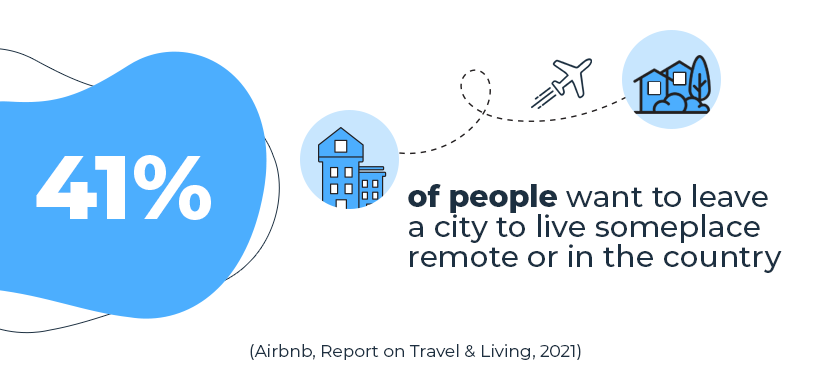
- 64% of tourists are interested in traveling during off-peak times.
- City-centric trips are gaining ground, with searches going up for major cities such as Las Vegas (+40%), Melbourne (+90%), Paris (+30%), and Sydney (+85%).
(Expedia, Traveler Value Index, 2021)
- Three-quarters of consumers are likely to pick a destination they’ve never visited.
- Nearly 52% of travelers that have a trip planned will likely use a mode of transportation they’ve never used before.
- About 22% look for once-in-a-lifetime experiences on their next trip.
- 60% of travelers choose domestic travel for the short term.
- More consumers prefer to take frequent, shorter trips (41%) than those who want fewer, longer trips (28%) or a mixture of both (31%).
- 54% of travelers believe having the time to relax and do nothing is what makes them happiest.
(Expedia, Vacation Deprivation Study, 2021)
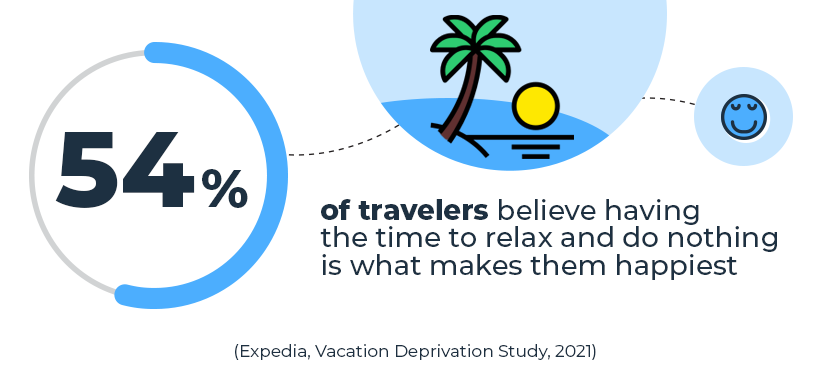
- Merely thinking about travel makes people feel much happier (by 18 percentage points) and more hopeful (by nine points) than they otherwise do on a regular day.
(Airbnb, From Isolation To Connection—Travel in 2021)
- Americans prioritize travel to be close to family (32%). Yet, they equally prioritize a new experience or destination (31%), ideally nearby, followed by a return to a favorite spot (25%).
- 56% prefer a domestic or local destination compared to just 21% who want to travel internationally.
- One in five want their destination to be within driving distance of home. As a result, travel by car draws the most interest, beating air travel by 17 points.
- Over half (51%) want to be isolated beyond major tourist areas rather than being “surrounded by people and energy” (24%).
- A quarter of Americans are open to traveling during off-peak times.
- Just 21% of those who took a cruise trip in the past say they’ll do it again .
(ABTA, Six Trends for Travel in 2021)
- 58% of people are interested in an ocean cruise, and 31% would like to go on a river cruise.
- Most Americans agree that travel creates greater cultural understanding (63%) and makes you more connected to the world (62%).
(Expedia, 2021 Travel Trends Report)
- Four in five domestic trips people take are for leisure.
(US Travel Association)
- International travel spending supports around 1.2M US jobs and accounts for $33.6B in wages.
- Top leisure travel activities in the US for overseas visitors:
- Sightseeing
- Fine dining
- National parks/monuments
- Amusement/theme parks
- 64% of leisure US travelers find accommodation, and 68% find trip experiences online.
(Facebook IQ, 2018)
- 46% of consumers post hotel reviews. Another 40% review the activities, attractions, and restaurants they visited.
(MDGadvertising, 2018)
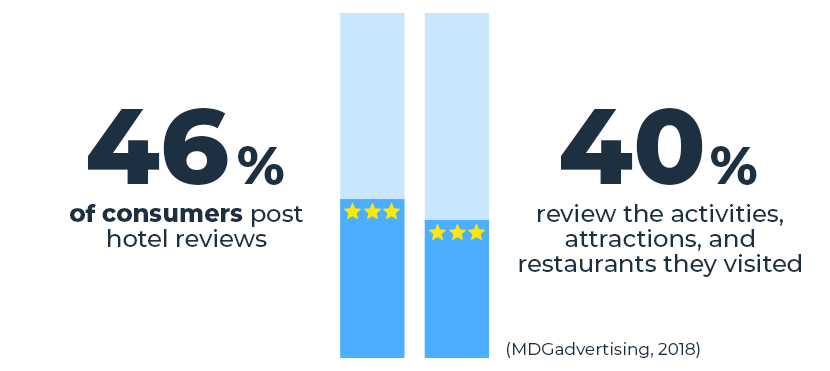
- 19% of Airbnb Homes guests used Airbnb to travel and work remotely in 2020.
- 55% of Airbnb long-term stay bookers worked or studied during their stay.
- 72% of consumers consider flexibility the key driver for business travel.
(Concur, Global Business Traveler Report 2021)
- 52% of business travelers expect the freedom to book direct flights.
- Around 42% hold themselves most accountable for their health and safety on a trip.
- Among the essential perks of business travel are the ability to choose accommodation (46%) and mode of transport (43%).
- Direct spending on business travel by domestic and international travelers totaled $334.2B in 2019. That included expenditures on meetings, events, and incentive programs.
- Americans logged 464.4M business trips in 2019, with 38% for meetings and events.
- The jobs supported by travel expenditures include 9M in the travel industry and 6.8M in related sectors.
- The amount of wages shared by American workers directly employed by travel is $277.4B.
- The percentage of America’s GDP attributed to travel and tourism is 2.9%.
- One in 10 US jobs are dependent on travel and tourism.
- Employment-wise, travel is among the top 10 industries in 49 states and D.C.
- Business travelers make up 12% of airlines’ passengers. Yet, they represent 75% of the profit.
(Investopedia, How Much Airline Revenue Comes From Business Travelers, 2020)
- The global market for business travel is expected to fully recover by 2026. At this point, it’ll likely reach $829.5B.
(ReportLinker, 2020)
- The average daily cost of business travel in the US is $325.
(Small Biz Genius, 2021)
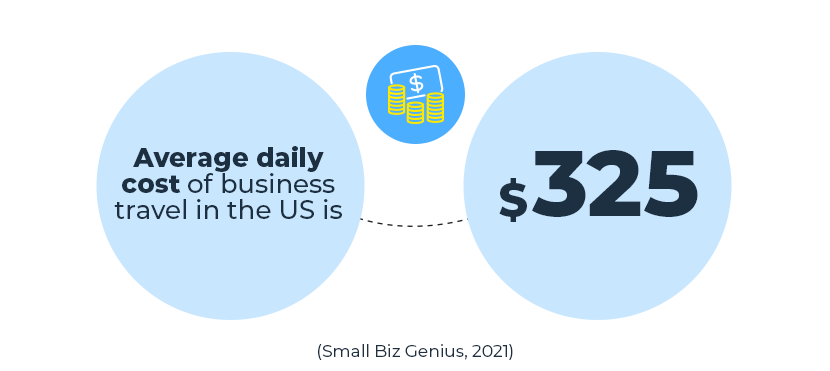
- Companies spend roughly $1,425 for every employee who goes on a business trip.
(Fyle, 2020)
- The average business travel budget consists of:
- Lodging (34%)
- Airfare (27%)
- Meals (20%)
- Car rentals (19%)
(Travel Pulse, 2020)
- For nearly 70% of business travelers, the key considerations in booking airline tickets after COVID-19 are flexibility in cancellation and changing ticket conditions.
(Skift Research & McKinsey, 2020)
- Over 700K businesses used “Airbnb for Work” for corporate trips in 2018.
(PhocusWire, 2018)
- When it comes to accommodation, business travelers pay attention to:
- Quality (44%)
- Convenience (40%)
- Trustworthiness (38%)
- Quietness (30%)
- Affordability (28%)
- Coziness (28%)
(CWT, 2019)
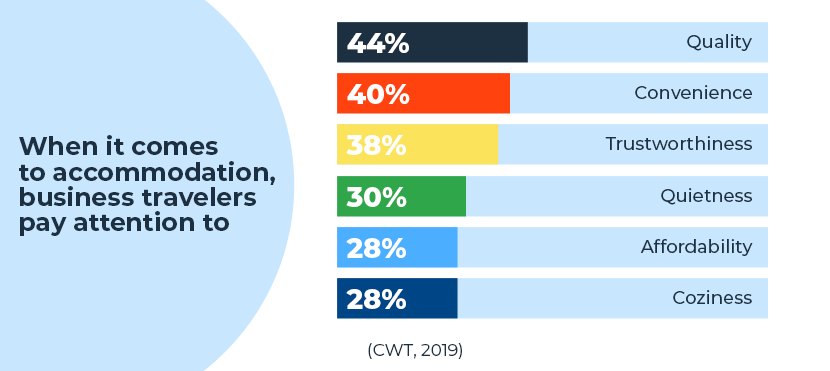
- 91% of corporate travel managers believe business travel is essential to organizational growth.
(Skift + TripActions, The State of Business Travel, 2020)
- Over a third of people (34%) had larger travel budgets in 2021 compared to 2020.
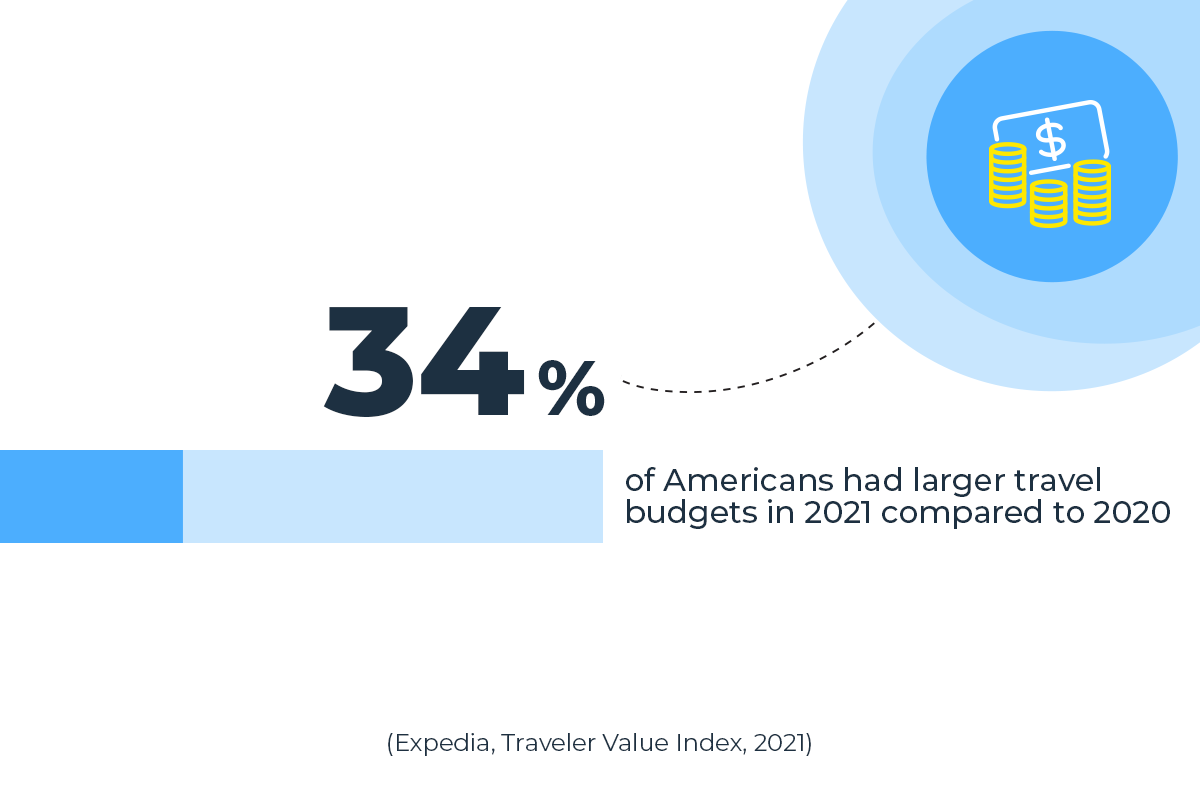
- To save money for travel, 43% of Americans would limit dining out or takeout, and 38% would give up alcohol.
- One in four travelers most value the ability to get a full refund across all travel experiences.
- Most people (52%) want to see a range of prices and options for a specific type of experience, as well as the ability to book accommodation and transportation in one transaction (38%).
- Every overseas traveler spends around $4,200 when they visit the US and stays 18 nights on average.
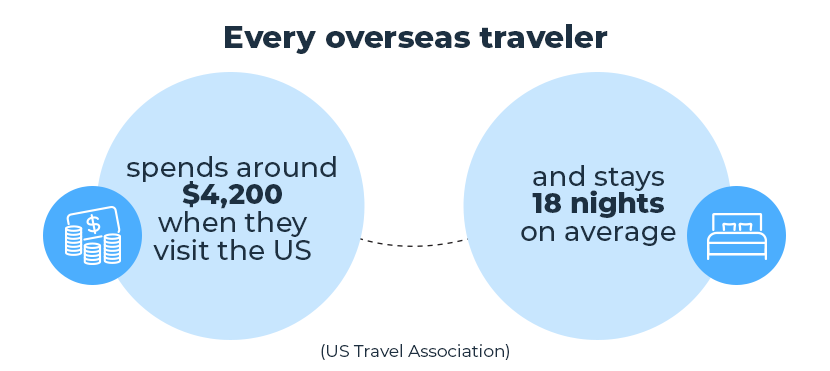
- Direct spending by resident and international travelers in the US averaged $3.1B a day.
- Travel accounts for around 2% of the total annual budgets of all US households.
(ValuePenguin)
- For a typical trip within the US, people spend an average of $581 and go away for about four nights.
- The typical vacationing US family spends about 44% of their travel funds getting to, from, and around their destinations.
- Americans spend an average of $33 per day on food when vacationing in their home country.
- On international trips, however, Americans spend about $35 per day—nearly 90% of those funds go to restaurant meals.
- Only 12% of Americans report buying alcohol on vacation.
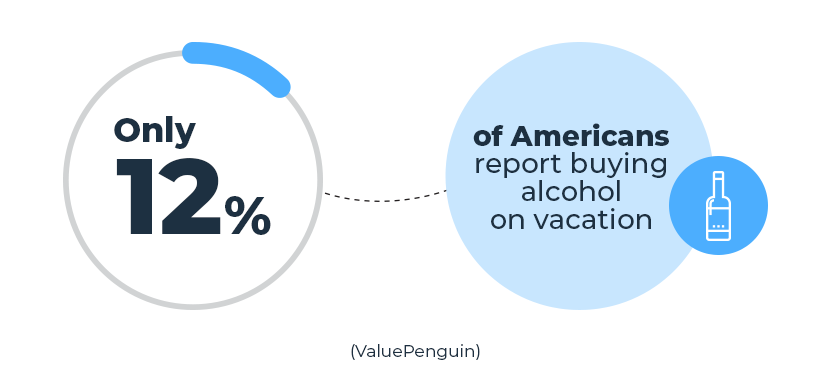
- People who travel spend about 9% of their budget on entertainment. That’s about $52, on average, for a domestic trip and $293 while abroad.
- Around 68% of travelers want to see their money reinvested in the local economy.
(Regiondo, Where Travel Is Going in 2021)

Looking for passport photos? Discover more information:
- US Visa Photo
- Passport Photos Near Me
- Get Your Immaculate 2×2 In. Photo
- The total number of flights operated in July 2021 reached 86% of pre-pandemic levels.
(US Department of Transportation, Air Travel Consumer Report, 2021)
- 66% of US travelers find flights online.
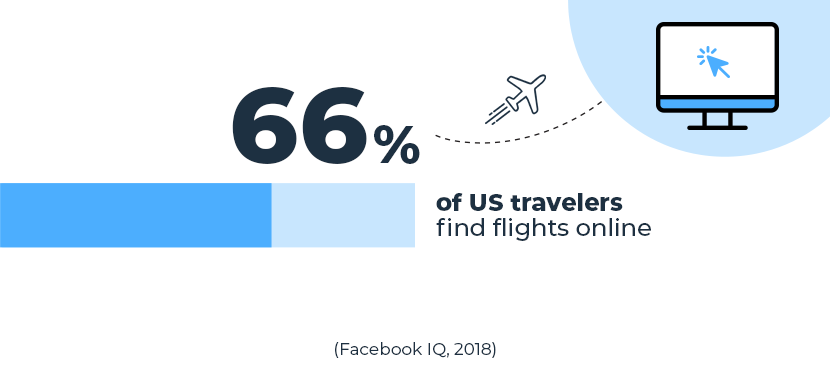
- 53% of flight shoppers in the US who are on Facebook use it to see travel pictures from friends and family.
- A little over half of Americans claim that once they decide to go on a trip, they spend less than a week researching flights.
- US flight shoppers’ decision to book flights is influenced by:
- Past experiences (94%)
- Loyalty programs (80%)
- Recommendations from friends and family (70%)
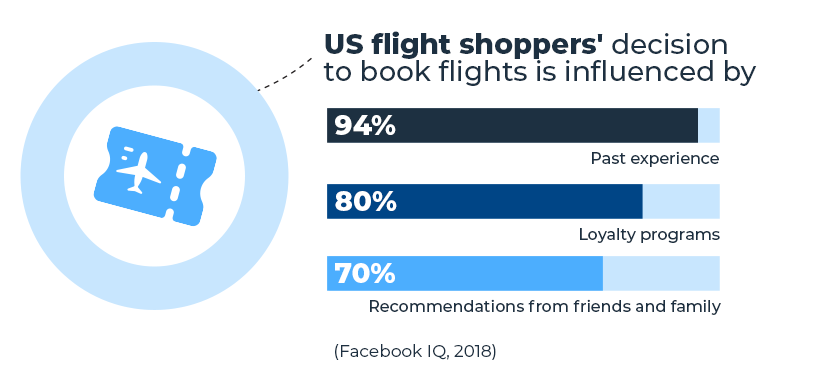
- 71% of US travelers book flights at least one month ahead of the trip.
- Nearly 65% of flight shoppers want post-purchase engagement from brands, with live updates and discounts being the most desired updates.
- Americans spend over $3,304 on airfare per year on average.
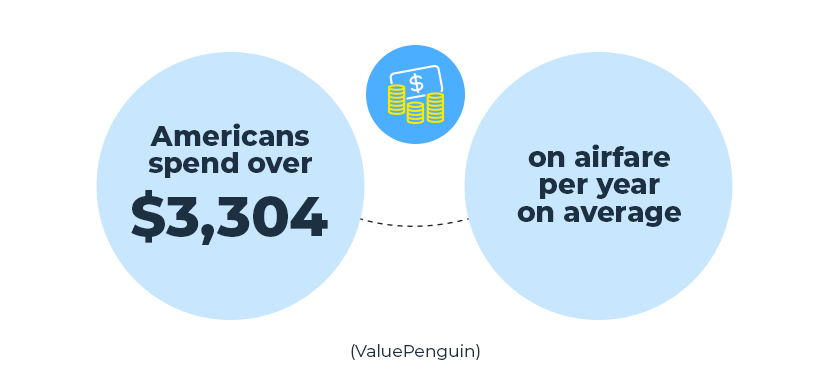
- The top three reasons travelers are more likely to book an extra night:
- Room discount
- Free breakfast
- Room upgrade
(Expedia, What Travelers Want in 2021)
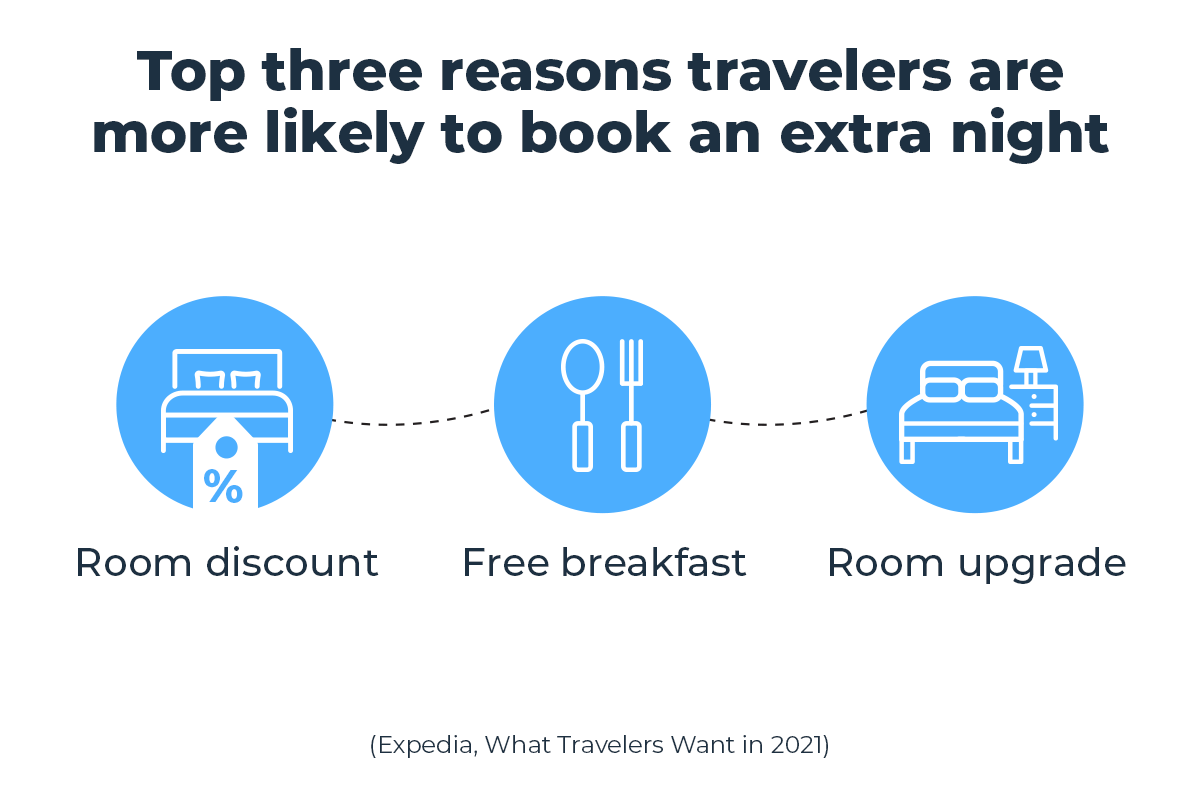
- Affordability is the key priority when choosing accommodation, beating health and safety protocols by 10 points.
- Around 75% of Americans want to search for accommodation within a range of dates.
- 77% of US consumers want the ability to cancel or change bookings at the last minute.
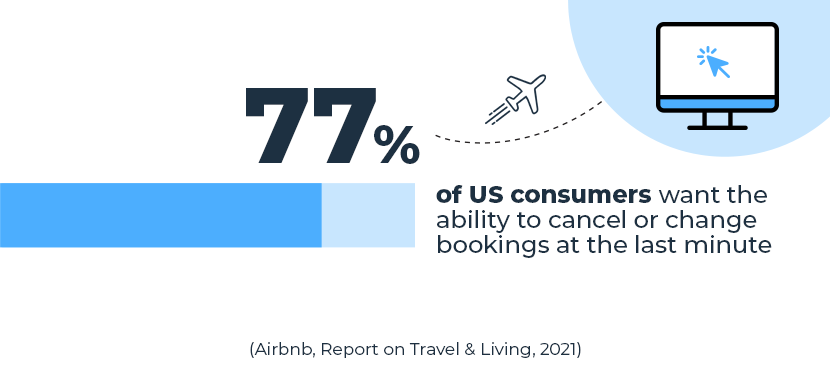
- The percentage of long-term stays (28 nights or more) on Airbnb nearly doubled from 14% of nights booked in 2019 to 24% in Q1 2021.
- 48% of travelers are open to booking via sites and companies they’ve never used if they believe the travel provider is trustworthy.
- Nearly 65% of consumers are more likely to book with travel providers that identify their practices as “inclusive.” It includes properties that are:
- Owned by women
- Welcoming to the LGBTQIA+ community
- Supportive of people with disabilities
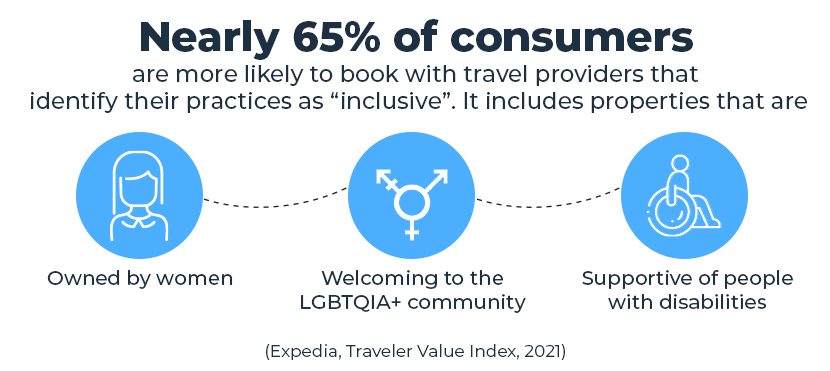
- For 57% of consumers, detailed photos give them the confidence to book accommodation.
- Nearly 70% are willing to pay extra for properties that have their favorite amenities and services.
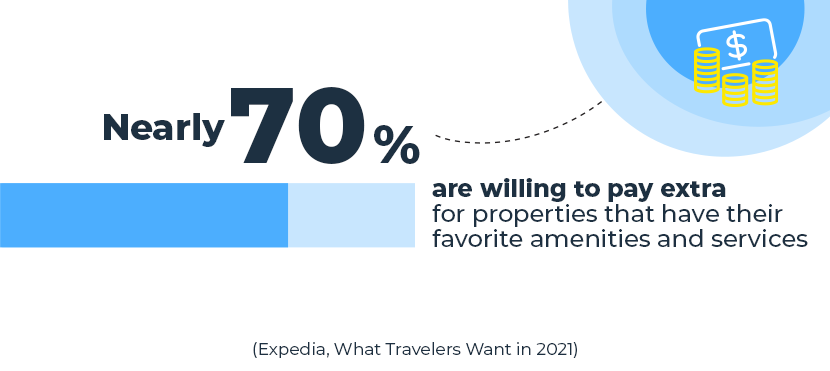
- 89% of travelers want to see some information or features of the surrounding location.
- Nearly 60% of travelers are unlikely to book a non-refundable room in exchange for a reduced rate.
- For most travelers (91%), photos are critical when booking accommodation.
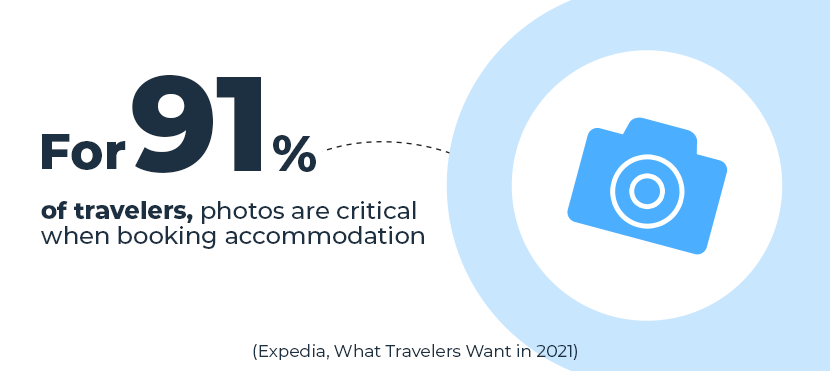
- Consumers view an average of nine photos before making a booking decision.
- 87% want to receive information from the chosen accommodation before check-in.
- For 77%, accommodation must have core technology amenities.
- One in three travelers want to see destination messaging regarding social-distancing measures and cleanliness standards.
- 91% of travelers believe property owners and managers should reply to negative reviews.
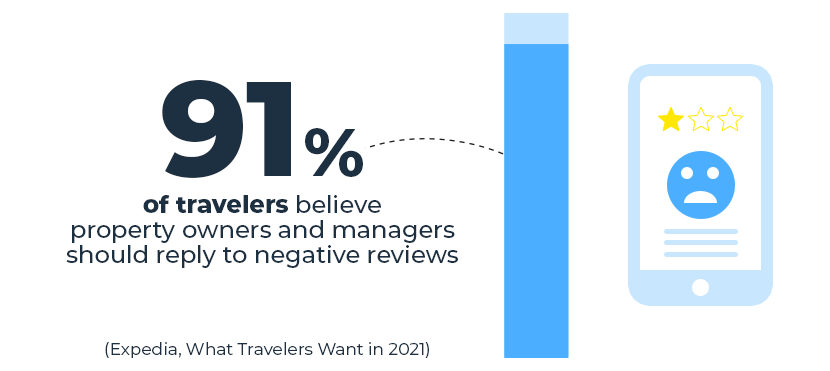
- Only 9% of consumers believe there’s nothing properties could do to make them feel more comfortable after reading a negative review.
- Nearly 59% of travelers are willing to spend extra to make their vacation more sustainable.
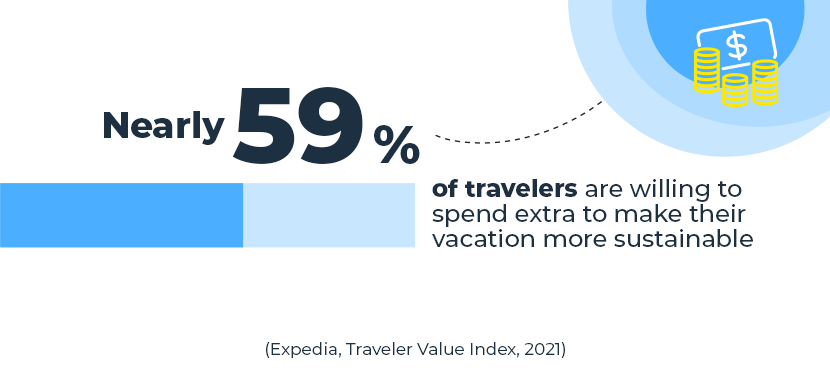
- 56% of people under 50 would be “much” or “somewhat more likely” to use an online platform that lets them search for green accommodation. Yet, only 28% of those aged 50+ would follow suit.
- In 2011, only 19% of people were more likely to choose one company over another based on a better environmental record, compared to 38% in 2020.
- 61% of travelers claim the pandemic made them want to travel more sustainably in the future.
(Booking.com, Sustainable Travel Report 2021)
- For 49% of people, COVID-19 has encouraged them to make positive changes in their everyday lives.
- The three biggest impact concerns for travelers are:
- Excess waste (46%)
- Threats to local wildlife and natural habitats (38%)
- Overcrowding of popular sights or destinations (30%)
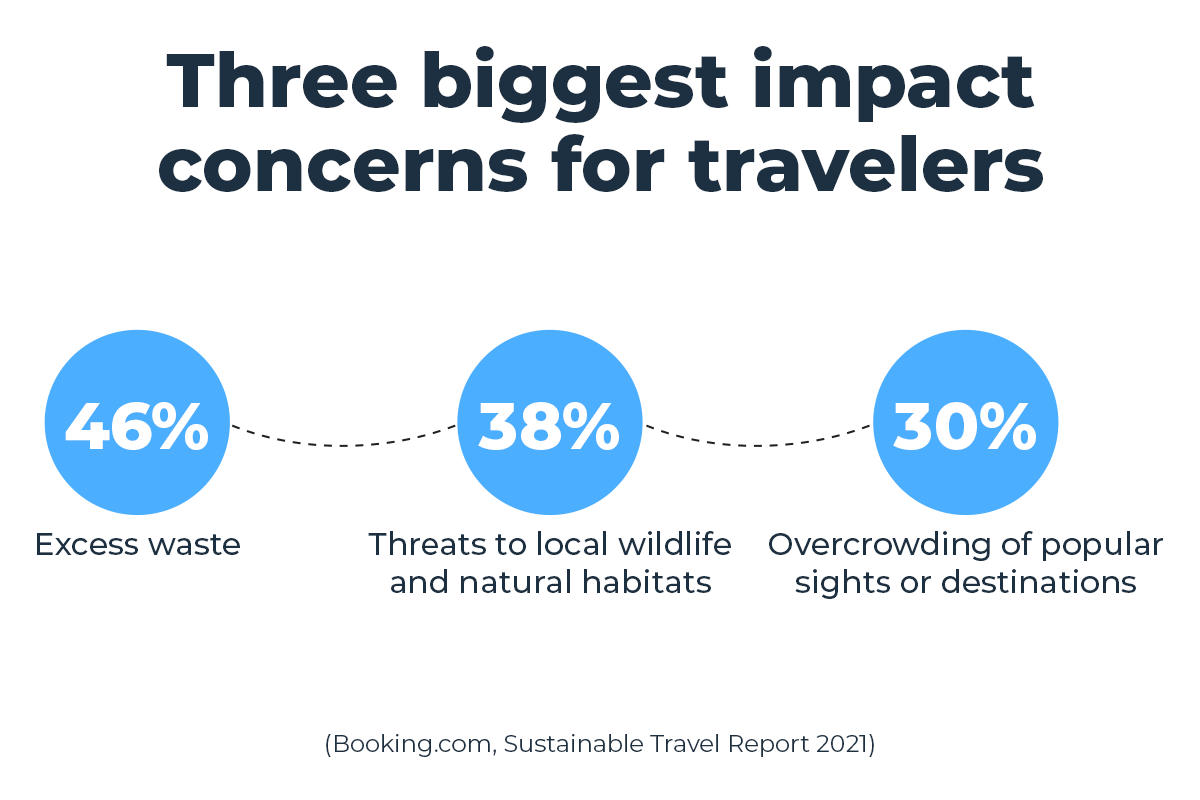
- 76% of travelers say they’ll seek accommodation with reputable third-party sustainability accreditation.
- Nearly 73% would be more likely to choose accommodation with sustainability practices.
- 40% of travelers believe it’d be helpful if booking sites used a clear label that showed if the accommodation was more sustainable.
- Almost 40% would like booking sites to offer a sustainable filter option.
- 35% want travel companies to provide tips on how to adopt better sustainability practices while traveling.
- 72% believe travel companies should offer more sustainable choices.
- 41% of travelers don’t know how to find sustainable travel options.
- Nearly 45% make a conscious decision to turn off their AC/heater in their accommodation when they aren’t there.
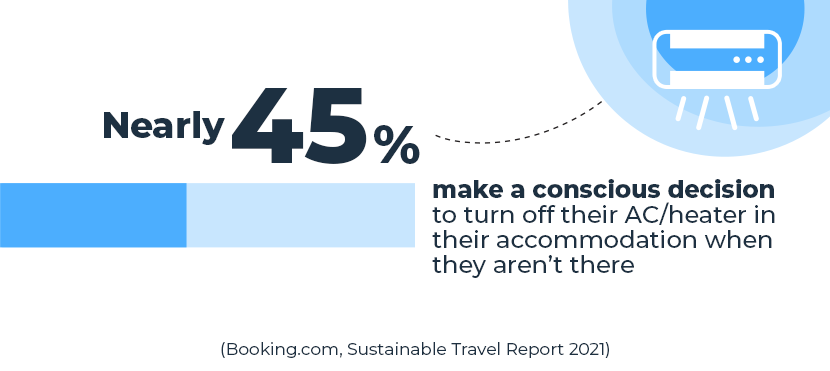
- 43% took their reusable water bottle to avoid buying bottled water while on vacation.
- 40% of travelers reused the same towel to reduce water usage.
- 42% shopped at small, independent stores to support the local economy during their stay.
- 27% of people believe properties should offer the option to opt out of daily room cleaning to lower water usage.
- About 27% of travelers would prefer only being offered reusable plates and cutlery for all meals, including room service.
- A full 53% grow annoyed if somewhere they are staying prevents them from being sustainable.
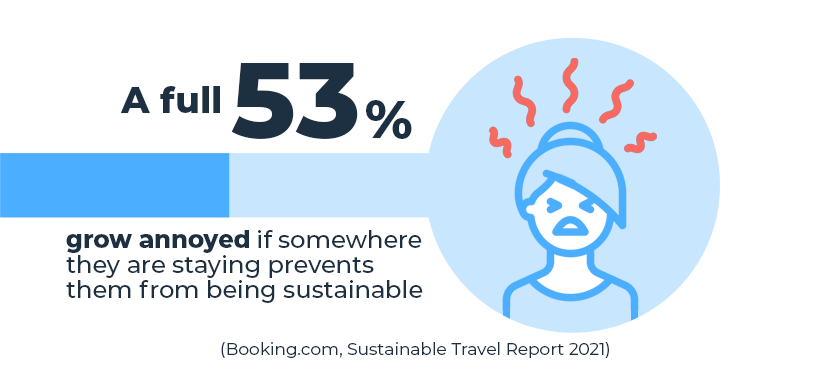
- Nearly 93% of travelers are compelled to take phones on vacation.
(BankMyCell, Digital Detox on Vacation, 2019)
- 42% of consumers use smartphones to research trips.
- 85% of consumers use smartphones to book activities, including restaurant reservations and sightseeing tours.
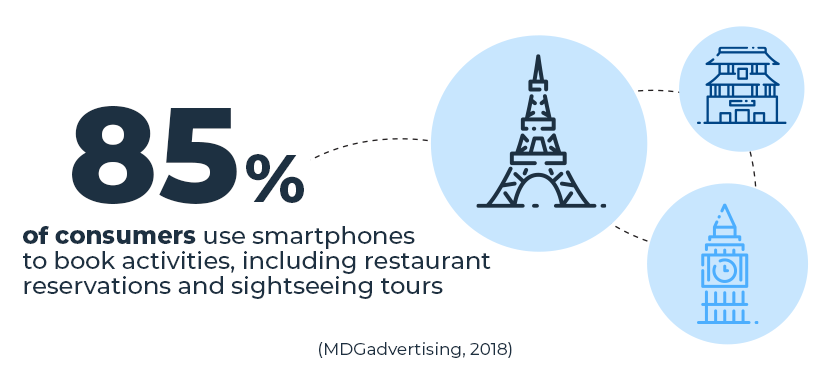
- 60% of travelers rely on phones for navigation.
- Women are 1.8X more likely than men to discover flights via mobile.
- 33% of US travelers aged 18–34 book flights via smartphones.
- 58% of Americans that bought airline tickets on mobile did so because it was more convenient.
- 64% of travelers use smartphones en route to their destination.
(Travelport, 2018 Digital Traveler Survey)
- On average, US travelers use seven or eight apps throughout their searching, booking, and in-destination travel experience: maps (52%), weather (51%), and branded airlines (50%) top the list.
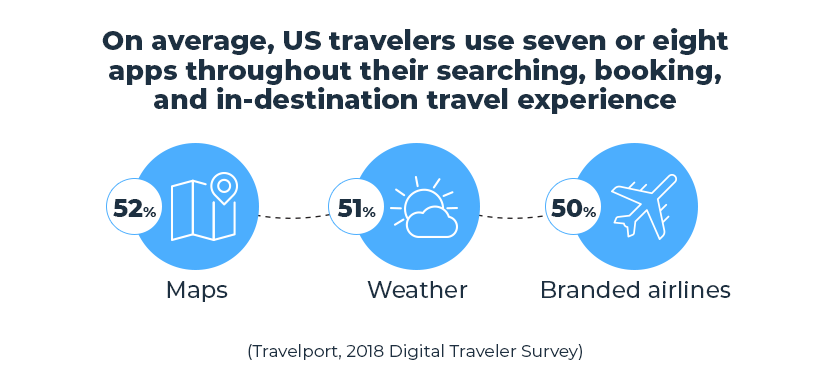
- Over 50% of US travelers would prefer to use an app for adding extras to their bookings on the go.
- The ability to pay using Apple/Android Pay within travel apps is an essential feature for 42% of US travelers.
- 44% of travelers have used voice to search for some part of their trip, with 20% of US tourists considering voice search a major influencer.
- Nearly 39% want to use a digital room key on their smartphone to unlock their hotel room door.
- 36% prefer the option to check in to their hotel via an app rather than at a reception desk.
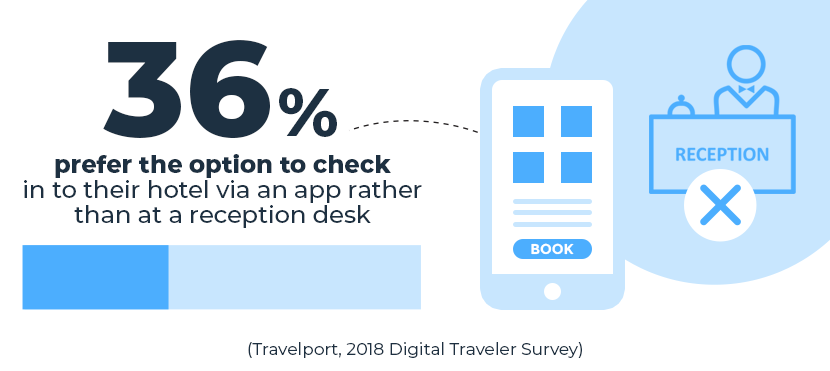
- 66% of US consumers agree digital boarding passes make travel “so much easier.”
- Almost 50% of US travelers want to “live chat with a travel representative” via a favorite travel app.
- 47% of tourists regret overusing smartphones on vacation.
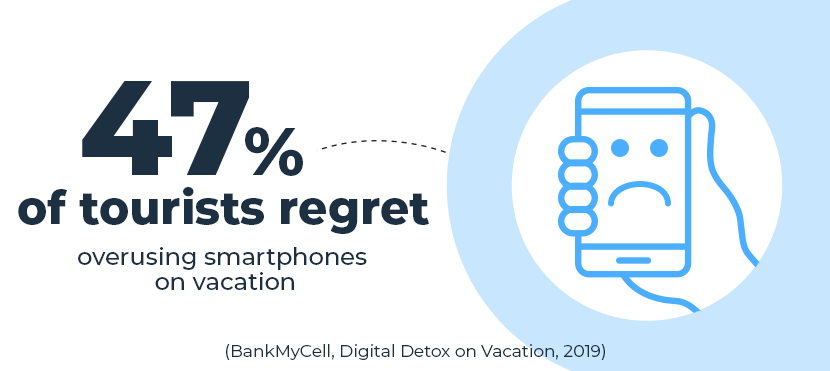
- For 93% of people, the camera is the most used smartphone function abroad.
- 37% of vacationers send and respond to emails.
- 36% of people grow angry by their companion’s constant selfie- and photo-taking.
- 56% of consumers check their smartphone 1–5 times hourly while on vacation.
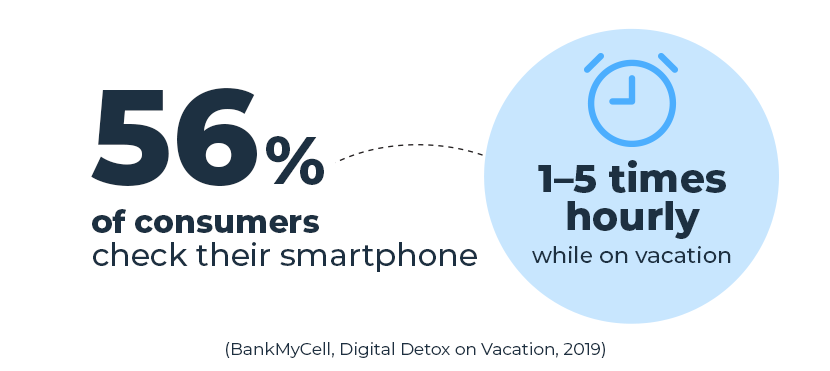
- Half of travelers believe having a smartphone on vacation makes it impossible to unplug.
- Travelers aged 18–34 use Facebook apps (now Meta) as the number one channel for destination discovery online.
- 74% of travelers use social media when on vacation.
(Martech Zone, 2018)
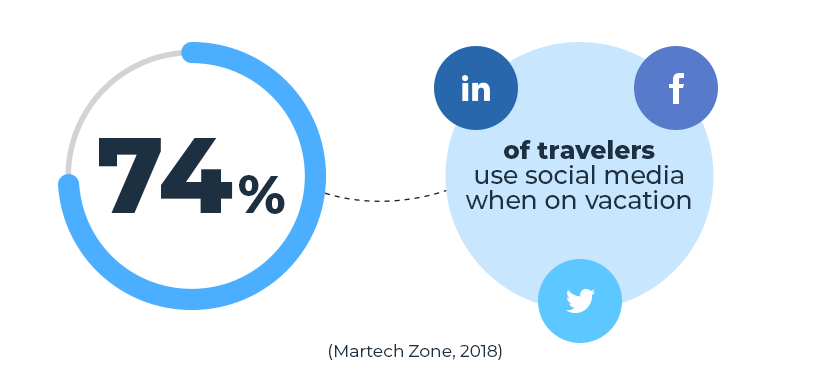
- 97% of Millennials share photos on social media when traveling, compared to 60% of other demographics.
- Nearly 34% of US travelers take to social media when considering a trip.
- Friends’ photos on Facebook impact over 50% of people’s travel plans.
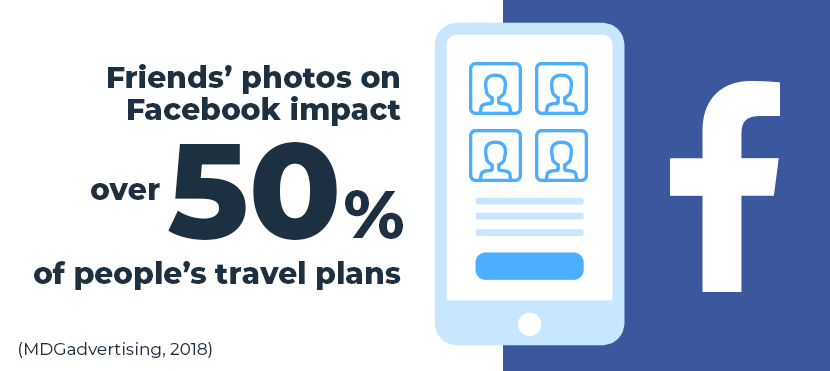
- 59% of travelers post an update on social media about an upcoming trip.
- Most Americans (74%) use social media tools during vacation.
- Around 60% of people use social media to showcase their vacation photos. When it comes to Millennials, this number rises to 90%.
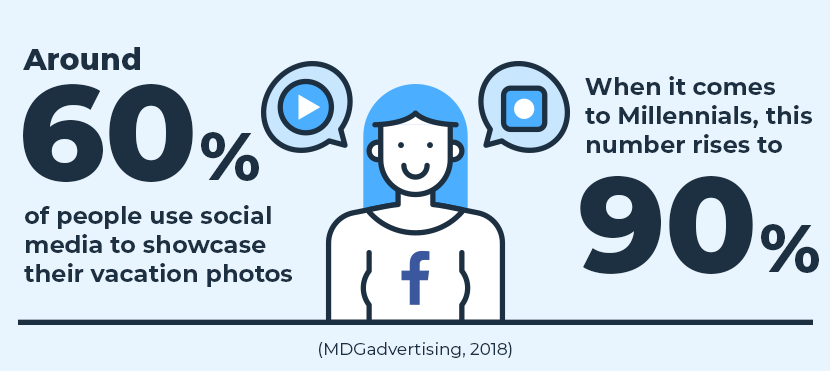
- 55% of travelers like Facebook pages specific to their trip.
- 72% of people often use social media on their getaways.
- 45% of travelers let “what could look good on social media” affect their choice of destination.
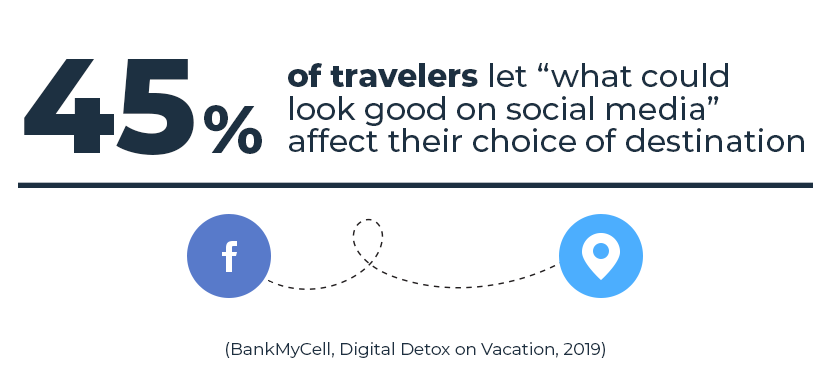
- Nearly half of travelers are afraid of catching the virus while using public transportation.
(Booking.com, The Future of Travel, 2020)
- Getaways were the second most popular trip type people were interested in right after beach trips, one year after the COVID-19 pandemic began.
- 42% of people will opt for longer-stay travel after the pandemic.
- About three-quarters of people are comfortable with the concept of a vaccine passport.
- For 75% of travelers, a vacation would make them happier than a new phone.
- Nearly 81% of working adults place more value on vacations post-pandemic. Of those, 66% even created a bucket list of places to visit.
- Seven in 10 travelers were ready to drive up to six hours for a trip amid the pandemic.
- 42% of travelers canceled one or more trips in 2020 due to COVID-19.
- The leading motivations to get the vaccine were to reconnect with friends and family (37%) and to feel safe while on vacation (32%).
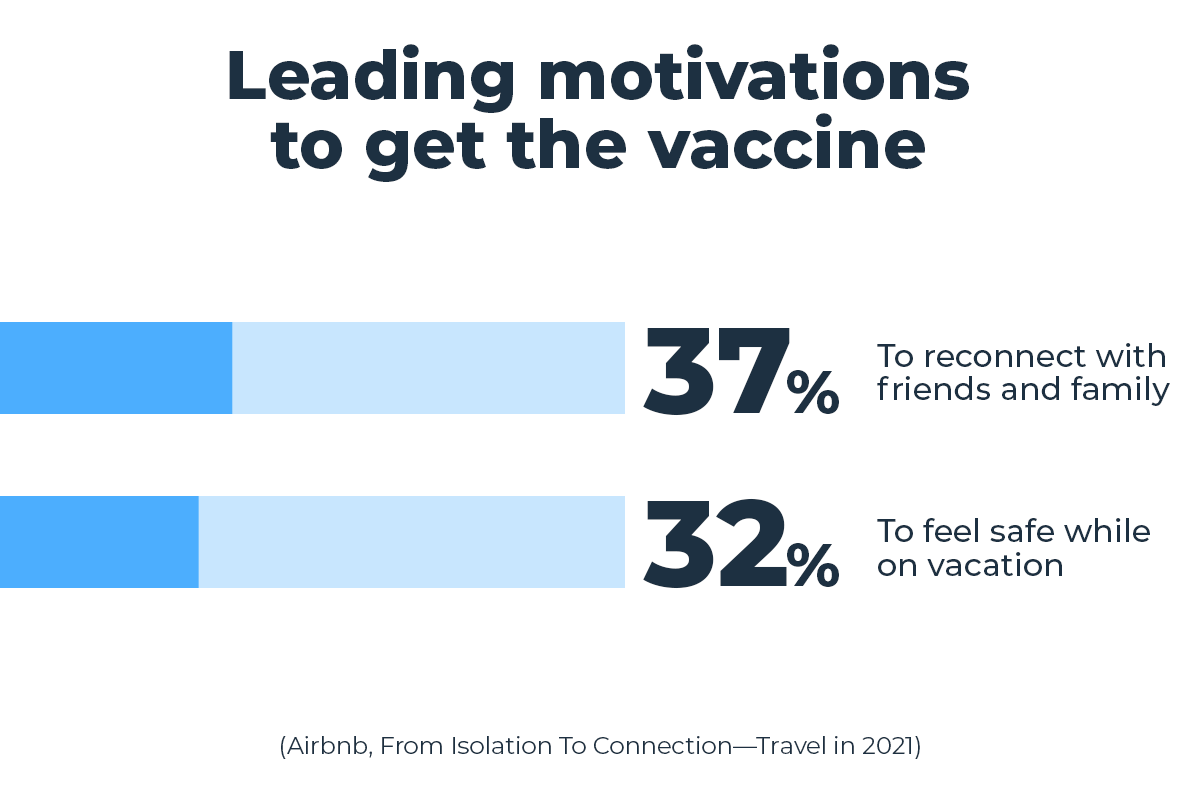
- 32% of travelers want “most people” at a destination to also be vaccinated to consider traveling there. Nearly a third also want testing to be available.
- Consumers are 20% more likely to use a travel professional to book their vacations now than before COVID-19. Two in five cite the following reasons:
- The security of a vacation package (41%)
- A travel professional’s up-to-date advice (40%)
- For 40% of travelers, accommodation reviews are more important today than before COVID-19.
What percentage of travelers write hotel reviews?
Nearly half of consumers ( 46% ) post hotel reviews. Another 40% review the activities, attractions, and restaurants they visited.
What’s the average cost of business travel?
The average daily cost of business travel in the US is $325 . Of course, this varies depending on where you’re traveling and staying.
How much do Americans spend on airfare?
Americans spend over $3,304 on airfare per year on average. That’s a lot of money to spend on getting from point A to point B.
Why should hotels respond to negative reviews?
91% of travelers believe property owners and managers should reply to negative reviews. After all, responding to customers’ feedback—good or bad—shows you care about what guests have to say.
Do travelers use social media while on vacation?
74% of travelers use social media when traveling. It’s a great way to keep friends and family updated on your travels and document your trip.
Stacking It All Up
There you have it.
A comprehensive list of facts, figures, and stats you can use to get a better picture of how people want to travel in 2023 and beyond.
Let us know in the comments if there are any other travel statistics you’d like to see.
Fair Use Statement
Did you like our infographics? If so, feel free to share them with your audience. Just remember to mention the source and link back to this page.

As a Digital PR specialist and a member of the Society of Professional Journalists (SPJ), Max has 5+ years of writing experience. Over the course of his career, Max’s work has garnered significant attention, with features in numerous prominent publications such as The New York Times, Forbes, Inc., Business Insider, Fast Company, Entrepreneur, BBC, TechRepublic, Glassdoor, and G2.
Every product is independently selected by (obsessive) editors. Things you buy through our links may earn us a commission.
This Beginner-Friendly Vitamin C Is 30 Percent Off

When I was a young beauty editor, a dermatologist said something to me that stuck: The average person only needs three products in their routine — a good sunscreen , retinol , and vitamin C . A vitamin C, they said, did most everything one might generally need. The antioxidants help to protect skin from environmental stressors like pollution, lighten up hyperpigmentation, and give skin an overall glow. All that said, vitamin C is finicky, and finding a good one can be challenging. It’s notoriously unstable and liable to go bad, and then sometimes it’s too strong and can be sensitizing for skin. This one, from Klairs, an OG from our beauty columnist Rio Viera-Newton’s famous skin-care Google doc , is especially good for sensitive skin and newbies because of its low concentration. “If you’re looking to try out a vitamin C serum for the first time and aren’t so sure how your skin will respond, this is the perfect one to get started,” she says. In addition to ascorbic acid, it also contains centella asiatica extract to support the skin barrier and reduce redness and inflammation, and yuja fruit, which is chock-full of naturally occurring vitamin C. It’s currently 30 percent off at Soko Glam as part of its July 4 sale, and Ulta, too.

The Strategist is designed to surface useful, expert recommendations for things to buy across the vast e-commerce landscape. Every product is independently selected by our team of editors, whom you can read about here . We update links when possible, but note that deals can expire and all prices are subject to change.
- the strategist
- deal of the day
Every product is independently selected by (obsessive) editors. Things you buy through our links may earn us a commission.
Micro Sales
Greatest hits, most viewed stories.
- All the Best Fourth of July Sales
- The 9 Very Best Tinted Moisturizers
- The 16 Very Best Protein Powders
- The 13 Very Best Vitamin-C Serums
- All the Best Early Amazon Prime Day Deals (So Far)
Today’s Top Clicked

Save on Rooms at Select Disney Resort Hotels This Fall and Holiday Season
View All Special Offers

- Save up to 30% on rooms for stays most nights from November 24 to December 25, 2024
- Enjoy other savings for stays most Sunday to Thursday nights from October 6 to November 21, 2024
Plus, get FREE Park Hopper benefits when you take advantage of this offer and upgrade to a Walt Disney Travel Company room-and-ticket package that includes nondiscounted 4-day (or longer) date-based theme park tickets! With Park Hopper benefits, you can visit multiple theme parks each day of your ticket. Learn more about Park Hopper benefits .
This offer is valid for the Disney Resort hotels listed below. View the chart to explore savings.

Stay in the Magic!
With Disney Resorts Collection, you can experience the same legendary detail, service and storytelling found in the theme parks. Read More
With Disney Resorts Collection, you can experience the same legendary detail, service and storytelling found in the theme parks. And you’ll discover enchantment around every corner.
Explore some highlights of staying at a Disney Resort hotel:
Early Theme Park Entry When you stay at a Disney Resort hotel, you can get 30 minutes early entry to any theme park on each day of your stay (subject to capacity)—so you can enjoy select attractions, shops and dining before regular park opening.
For early theme park entry, you’ll need a MagicBand, Disney MagicMobile service or a Key to the World Card, as well as valid admission. Theme park reservations may be required based on admission type. Learn more about theme park reservations .
Extended Evening Theme Park Hours When you stay at a Disney Deluxe Resort or Disney Deluxe Villa Resort, you’ll enjoy extended evening hours on select nights in select theme parks.
For extended evening hours, you’ll need a MagicBand, Disney MagicMobile service or a Key to the World Card, as well as valid admission. Theme park reservations may be required based on admission type. Learn more about theme park reservations .
Get Around with Ease Complimentary transportation options make it easy—and fun—to get around Walt Disney World Resort. Zip about on the world-famous monorail, glide across the sky on Disney Skyliner and cruise along serene waterways aboard a water taxi. Some Disney Resort hotels are even within walking distance of select theme parks.
Magic Around Every Corner Be immersed in fantastical worlds both real and imagined—including some favorite Disney and Pixar tales. Whether you’re taking in views of an African savanna, splashing into a whimsically themed pool or savoring the flavors of the Polynesian Isles, you’ll find fun and surprising Disney touches in every detail.
The fun is seemingly endless at a Disney Resort hotel, where you can enjoy themed pools with waterslides, poolside activities and delicious dining experiences. You may even spot some familiar Disney friends!
Activities and amenities vary by Disney Resort hotel.

Holiday Décor and More
Disney Resort hotels get decked out in seasonal style just in time for the holidays! Read More
Disney Resort hotels get decked out in seasonal style just in time for the holidays!
Each Disney Resort hotel is uniquely transformed with festive touches. Highlights include:
- Grand Christmas trees —inspired by some favorite Disney stories and locations—adorned with shimmering ornaments and twinkling lights
- Cheerful decorations and accents to spruce up the scene
Plus, be on the lookout for holiday treats during your stay—available at select dining locations and shops for a limited time.

Fun in the Theme Parks
When you add valid theme park admission, you can discover new experiences and classic favorites at Walt Disney World Resort. Read More
When you add valid theme park admission, you can discover new experiences and classic favorites at Walt Disney World Resort.
Theme Park Reservations To enter a theme park, a theme park reservation may be required based on admission type. Learn more about theme park reservations .
View the park reservation availability calendar .
- Embark on a culinary adventure around the world at EPCOT International Food & Wine Festival —from August 29 to November 23, 2024.
- Feel oh-so-jolly when you observe global holiday traditions shared by storytellers from around the world at EPCOT International Festival of the Holidays —from November 29 to December 30, 2024.
- Stroll along a lush trail where you can explore the wonders of water and discover its playful personality at Journey of Water, Inspired by Moana .
- Blast off on an intergalactic chase with Rocket, Groot, Gamora and Star-Lord on Guardians of the Galaxy: Cosmic Rewind —a coaster inspired by the rockin’ movies.
- Board an ancient Norwegian vessel and be whisked away to the kingdom of Arendelle during Frozen Ever After .
- Meet some of your favorite Disney Characters at Mickey & Friends in CommuniCore Hall, a delightful new location at EPCOT.
Disney’s Animal Kingdom Theme Park
- Enjoy spirited holiday entertainment! Meet Mickey Mouse and Minnie Mouse dressed in holiday attire at Adventurers Outpost. Plus, check out the Merry Menagerie on Discovery Island, featuring artisan-sculpted puppets of reindeer, foxes, polar bears and other arctic animals—November 12 through late December.
- Celebrate the magic of nature at Pandora – The World of Avatar . Here, you can fly on the back of a banshee on Avatar Flight of Passage , hike amid floating mountains in the Valley of Mo’ara and take a mystical boat ride into a bioluminescent rainforest on the Na’vi River Journey .
- Set off in an open-air vehicle across a lush African savanna teeming with exotic animals on Kilimanjaro Safaris .
- Witness Finding Nemo : The Big Blue… and Beyond! —a vibrant stage show set in the underwater world of Finding Nemo .
- Behold Festival of the Lion King —a larger-than-life show filled with pageantry, puppetry and classic songs from The Lion King .
- Speed through the Himalayas on a runaway train while avoiding the clutches of the Yeti on Expedition Everest – Legend of the Forbidden Mountain.
Magic Kingdom Park
- Get wrapped up in all things merry and bright, with holiday decorations and cheerful touches around the park from November 12 through late December. You won’t want to miss Frozen Holiday Surprise , a dazzling experience that will illuminate Cinderella Castle—featuring appearances from Elsa, Anna and other Frozen friends.
- NEW! Drop on in to Tiana’s Bayou Adventure —a new attraction where bayou thrills meet Disney magic! Join Princess Tiana and jazz-loving alligator Louis as they traverse winding waterways in search of musical critters for a grand celebration during Mardi Gras season.
- Leave the real world behind for a high-stakes race across the Grid—the dark, computerized world from TRON —on TRON Lightcycle / Run presented by Enterprise.
- Feast your eyes on a Happily Ever After , a nighttime fireworks spectacular featuring lights, lasers and special effects.
- Explore iconic attractions and experiences in 6 incredible lands—including Seven Dwarfs Mine Train , a swaying family coaster ride that will have you racing through a diamond mine.
- Be dazzled by music, dancing and vivid pageantry during the Festival of Fantasy Parade —a grand tribute to the tales and inhabitants of Fantasyland.
- Take off on an exhilarating coaster ride on Space Mountain and Big Thunder Mountain Railroad .
- Rediscover beloved classic Disney attractions such as Jungle Cruise and Haunted Mansion .
Disney’s Hollywood Studios
- Gaze in wonder as the Hollywood Tower Hotel is transformed with captivating holiday projections during Sunset Seasons Greetings —from November 12 through late December.
- Live your adventure in a galaxy far, far away at Star Wars: Galaxy's Edge ! Experience 2 thrilling attractions, build your own droid or lightsaber, savor Batuu’s tasty food and beverages, shop for themed merchandise and more!
- Discover big fun for kids and grown-ups alike at Toy Story Land . Take a wild ride on Slinky Dog Dash and go for a whirl on Alien Swirling Saucers .
- Witness the power of Mickey’s imagination at Fantasmic! This nighttime show is filled with exciting stunts, dazzling pyrotechnics, favorite Characters and moving music.
- Hurtle up and down on a haunted elevator ride at The Twilight Zone Tower of Terror™.
- Hear from Royal Historians of Arendelle and sing along to popular Frozen tunes during For the First Time in Forever: A Frozen Sing-Along Celebration . And starting November 12, 2024, enjoy a festive finale featuring Olaf the snowman.
- Watch in awe as a stunt team recreates thrilling movie moments during Indiana Jones Epic Stunt Spectacular .

Mickey’s Very Merry Christmas Party
The most magical holiday tradition returns to Magic Kingdom park on select nights from November 8 to December 20, 2024. Read More
The most magical holiday tradition returns to Magic Kingdom park on select nights from November 8 to December 20, 2024.
Holiday wishes come true when you celebrate the season with Mickey Mouse and pals at this separate-ticket event. With a ticket to this event, you can:
- Gather to watch Disney Characters give a yuletide nod to the season during Mickey’s Once Upon a Christmastime Parade
- Behold fantastically festive entertainment, like Minnie’s Wonderful Christmastime Fireworks show !
- Get the perfect picture with Disney pals dressed in their Christmas best
- Savor sweet moments as you enjoy cookies and cocoa —included with your event ticket no additional charge
- Walk in a winter wonderland as you witness a stunning “snowfall” on Main Street, U.S.A!
- Take in the cheerful decorations that bring the spirit of the season to life
- Enjoy iconic Magic Kingdom attractions —including some with a holiday twist
Early Purchase Opportunity for Disney Resort Hotel Guests Special event tickets can be purchased starting July 10, 2024—and Guests of Disney Resort hotels and other select hotels can purchase tickets early, beginning on July 2, 2024.
Tickets are limited and may not be available for purchase on the day of the event (or earlier).
More Information Learn more about Mickey’s Very Merry Christmas Party —including how to purchase tickets to this event.

Upgrade to a Select Package—and Get Park Hopper Benefits FREE
When you take advantage of this room offer and upgrade to a Walt Disney Travel Company room-and-ticket package that includes nondiscounted 4-day (or longer) date-based theme park tickets, you’ll get Park Hopper benefits FREE! Read More
When you take advantage of this room offer and upgrade to a Walt Disney Travel Company room-and-ticket package that includes nondiscounted 4-day (or longer) date-based theme park tickets, you’ll get Park Hopper benefits FREE!
With Park Hopper benefits, you can visit multiple theme parks each day of your ticket. Learn more about Park Hopper benefits .
How to Book a Package After selecting your room, simply add on theme park tickets to create your room-and-ticket package.
Once you’ve selected your theme park tickets, you’ll have the option to add a dining plan to your package. With a dining plan, you can enjoy the convenience and flexibility of prepaid meals and snacks during your Walt Disney World vacation.
Theme Park Reservations Theme park reservations may be required based on admission type. Learn more about theme park reservations .
For admission types requiring theme park reservations, be sure to check reservation availability prior to purchase. Availability of theme park reservations is limited, not guaranteed and subject to change.

Make the Most of Your Day
Save time waiting in line with Lightning Lane entry !
To book by phone, call (407) 939-5277† and speak with a vacation-planning expert. Or, contact your travel agent.
Important Details
- Additional per-adult charges may apply if more than 2 adults per room at Disney Value, Moderate and Deluxe Resorts, and Studios at Disney Deluxe Villa Resorts.
- Cannot be combined with any other discount or promotion.
- Advance reservations required.
- Offer excludes the following room types: 3-Bedroom Villas; Deluxe Suites; Cabins at Copper Creek Villas & Cabins at Disney’s Wilderness Lodge; and Bungalows and Island Tower Rooms at Disney’s Polynesian Villas & Bungalows.
- Valid admission is required to enjoy the theme parks and is not included unless you upgrade to a room-and-ticket package. Theme park reservations may be required based on admission type. Learn more about theme park reservations .
View Offer Details
†Guests under age 18 must have parent or guardian permission to call.
Other Offers You May Like

Use CoBrowse to Share Your Screen?
Even as the Disney Cast Member guides you around our site, they will be unable to access or view any files or information on your device or anything you type.
To stop the session, click the X in the screen-sharing window at any time. You can remain on the phone with the Cast Member.
Enter the code provided by the Cast Member and Accept to get started.
Invalid code. Please reenter
Not on the Phone with a Cast Member?
Travel Insurance Statistics: Business Insider's Travel Insurance Survey
Affiliate links for the products on this page are from partners that compensate us (see our advertiser disclosure with our list of partners for more details). However, our opinions are our own. See how we rate insurance products to write unbiased product reviews.
Business Insider conducted a travel insurance survey of 971 US adults in December 2023 through Momentive AI Audience.
- It found that most travelers who bought travel insurance were concerned about their travel provider or their health.
- The survey also uncovered that most travelers would be willing to pay for insurance in the future.
- Compare the best travel insurance companies .
About 80% of those surveyed traveled for non-business reasons in the past year. Those travelers were most likely to travel internationally, by airplane (24%), or across state lines, by car (24%) or by airplane (18%). About 15% of respondents had traveled within their own state, by car. Of travelers surveyed, most (56%) paid $1,000 or less for their trip, while the vast majority (77%) paid $2,000 or less for their trip.
Among those travelers:
- The largest group of insured travelers (35%) bought insurance primarily because they feared issues like delayed flights or moved reservations, while about 29% were worried about a health emergency
- When researching travel insurance options, many buyers (28%) used suggestions and recommendations from family and friends
- The majority of insured travelers (55%) purchased their policy through a travel provider
- Of travelers who did not purchase insurance, 35% said their primary reason was because they'd never needed it on previous travels, and 19% said they didn't think their trip was expensive enough to insure
- Most people surveyed (68%) say they would be willing to pay some amount for travel insurance in the future
Why people buy travel insurance
Roughly 38% of surveyed travelers purchased insurance for their trip. About 13% of overall respondents purchased cancellation insurance, and 11% purchased cancel for any reason insurance (CFAR) . Another 14% said they purchased travel insurance, but were unsure what kind. The average cost of travel insurance varies by trip cost, destination, and age, but typically falls between $80 and $160 for a $2,000 trip.
The largest group of travelers (35%) who bought insurance did so primarily because they were concerned about the travel provider they booked with, and feared issues like delayed flights or moved reservations. About 29% were worried about having a potential health issue, and about 18% found the value or overall price to be appealing. About 11% said they always buy travel insurance out of habit, and just 5% said a friend had recommended it.
However, the largest percentage (28%) of travelers who purchased insurance researched their options by asking a friend or family member, followed by a review site, blog, or social media influencer (24%). Another 22% of respondents researched their options through a travel agent, and about 19% said they didn't do research at all.
Where travelers purchase their policies
The majority of insured travelers (55%) purchased a policy through a travel provider such as a booking engine like Expedia, or through an airline, a cruise provider, a tour group, or similar. The next most common place to purchase insurance was a travel agent (17%), followed by an insurance marketplace (13%).
Of those who responded to the survey, about 18% had purchased travel insurance and made a claim, while 24% had not made a claim on their coverage. Of those who made a claim, about half were satisfied with the outcome, and half were not.
When asked if they use any travel insurance features from their credit card — like trip delay coverage, baggage delay coverage, or rental car coverage — 33% of overall respondents said they did. However, more than a third of respondents whose credit cards carry these features said they still purchased separate travel insurance. Another 33% didn't know whether their cards come with this type of coverage.
Many travelers still don't see the need for insurance
About 62% of travelers surveyed did not purchase travel insurance; of those travelers, 35% said their primary reason to forgo insurance was because they'd traveled before and never needed it. About 19% said they didn't think their trip was expensive enough for insurance, and about 14% said they were trying to save money. About 13% said travel insurance never occurred to them. Only about 5% said they get travel insurance elsewhere, like through a credit card.
Travelers whose trips went as planned were largely happy with their decision not to purchase travel insurance: Over 70% said they didn't regret their decision to pass on a policy because nothing went wrong on their trip. Another 24% said they don't regret their choice simply because they never thought about travel insurance. About 6% of respondents felt differently: Nearly 4% wish they had purchased insurance because it would have given them peace of mind, and 2% regret their choice because something went wrong on their trip.
Most travelers would be willing to pay for insurance in the future
This holiday season, thousands of travelers experienced cancellations and delays and were even stranded at airports when Southwest airlines canceled 60% of its flying schedule , leaving travelers with little recourse.
About 68% of travelers surveyed by Insider — both those who had and hadn't purchased travel insurance in the past year — said they'd be willing to pay for travel insurance in the future to protect a weeklong, non-business trip. Most (49%) were willing to pay up to $150 for coverage, and some (13%) were willing to pay up to $250. Only about 5% were willing to pay more than $250, and about 32% were not willing to pay at all.
As we continue to see travel delays and disruptions, travel insurance will become more important and will be viewed as a necessity and not just an expense. The cost of travel insurance is small relative to the trip costs you can protect.
- Credit scores
- Credit history
- Credit reports
- Saving
- Housing
- The economy
- Financial trends
Watch: Marriott International's Tina Edmundson tells Insider that the travel mindset has changed since the pandemic
- Main content
Book your holiday travel now or maybe skip it this year: What you need to know
The holiday travel season is just around the corner, and this year, there's one piece of advice everyone seems to agree on: Book early.
How early? Well, if you're reading this now, you might want to open a new tab and start looking for flights or hotels – that's how early.
"Book your trip as soon as possible," advises Carol Mueller, vice president at Berkshire Hathaway Travel Protection . "Because the longer you wait, the more expensive the trip will be."
And that's if you're lucky. Flights, rental cars and rooms are selling out fast. In fact, it may be difficult to book for Thanksgiving, which is rapidly approaching. Christmas and New Year's are getting harder by the day, too.
Check out Elliott Confidential , the newsletter the travel industry doesn't want you to read. Each issue is filled with breaking news, deep insights, and exclusive strategies for becoming a better traveler. But don't tell anyone!
Learn more: Best travel insurance
That has some people rethinking their holiday travel plans, according to Joe Cronin, president of International Citizens Insurance .
"Many family and friends who typically travel long distances for the holidays are canceling their travel plans and opting instead to stay local or visit with others who are within driving distance," he said.
That doesn't have to happen to you. You can still take that dream trip during the holidays – or see your relatives who live across the country – with a little smart planning. Prices are surprisingly affordable, with the exception of hotels. But as always, there's also some last-minute drama, and I have some completely irreverent travel advice that could land you a bargain.
The biggest mistake you can make when going on a cruise happens before embarkation
America's train system doesn't favor you: Here is who to blame, how to begin fixing it
When are the travel holidays?
The holiday travel period in the U.S. is between the last week in November and the first week in January. It includes major holidays like Thanksgiving, Christmas and New Year’s.
Generally, it's one of the worst times of the year to travel, partly because of bad weather, and partly because of high demand. Almost everyone wants to go somewhere during the holidays. And that has never been more true than in 2023. Here's my personal advice for holiday travel :
What's the outlook for holiday travel prices?
Overall, domestic travel prices are down compared to the last holiday period.
◾ Thanksgiving airfares have fallen 14% from this time last year (to $268 per ticket), and Christmas airfares are down 12% (to $400 per ticket), according to Hoppe r.
◾ Car rental rates average $42 a day during Thanksgiving, a 17% decline from last year. The daily rate at Christmas is $10 higher, about the same as last year, Hopper predicts.
◾ Gas prices are steady. The Department of Energy predicts fuel prices will remain virtually unchanged, despite the turmoil in the Middle East. Nationwide, fuel prices should stay around $3.62 per gallon.
◾ Hotel rates are ticking higher, though. Prices for Thanksgiving stays are averaging $206 per night (up 9% from last year). For Christmas, the average room rate is $233 a night (up 7%), according to Hopper.
Most prices may be lower, but that's only half of the equation, said John Lovell, president of Travel Leaders Group . Airfares and rental cars may be a little more affordable – at least compared with the last holiday season – but that assumes there's availability. And travel advisers are seeing record demand going into the 2023 holiday travel season.
"Things are tight," said Lovell.
Is holiday travel safe in 2023?
One of the most common questions I've been getting from readers: Is it safe to go? It depends.
“Selecting your travel destinations needs a careful review," explained Mahmood Khan, a hospitality and tourism professor at Virginia Tech. Recent conflicts in the Middle East and ongoing problems in Eastern Europe have made holiday travelers more tentative. Staying in the U.S. or visiting safer developed countries during the holidays may be the best bet, experts said.
OK, where are the crowds?
Most Americans drive to their holiday destinations, and getting accurate predictions on driving intentions is difficult. But Priceline pulled some of its airfare booking data and found holiday air travelers were all headed to the same places, more or less.
Here's Priceline's list of the most popular Thanksgiving destinations in the U.S., along with the average roundtrip airfare to those places.
- New York ($453)
- Atlanta ($396)
- Dallas ($511)
- Los Angeles ($419)
- Chicago ($478)
The list of destinations shifts around for Christmas and New Year's, but New York is always at the top, and Atlanta is in second place on two lists.
How about internationally?
"Our review of this year’s top Thanksgiving destinations revealed that Mexico is a top choice for Americans traveling internationally – specifically Cancun, San Jose Del Cabo and Puerto Vallarta," said Daniel Durazo, director of external communications at Allianz Travel Insurance .
No babies on flights, planes? Why we should rethink how the little ones travel.
How to stay safer on your trip: 'No one plans on security issues' while traveling
Travel on these days if you want to avoid holiday travel pain
If you can't avoid the destination, try to travel on the least crowded day during that particular holiday period. Expedia's analysis of holiday booking data suggests that during the busy Thanksgiving holiday travel period, a flight departing on Monday, Nov. 20, is 12% cheaper than the Wednesday before Thanksgiving. Departing on Friday instead of Sunday will save you money, too.
The same thing goes for Christmas. Leave on Tuesday, Dec. 19, or on Christmas Eve, and you'll save 25% versus flying on Friday, Dec. 22. Those are slow days because most people prefer to fly later. Other uncrowded days: Christmas Eve or the holiday itself. Flights on Thanksgiving, Christmas Day and New Year's Day are historically less busy.
I told you this holiday travel season had some drama, so here it is: This week, Kayak released its latest airfare information. It suggested airfares were falling fast. Prices for domestic travel over Thanksgiving weekend are down 13% from last year, and even more surprising, they're down 7% in the last month. Cities like Richmond, Virginia, and Baltimore have seen price drops of nearly 30% since last Thanksgiving.
So that raises the question of whether you should follow the conventional wisdom (book now) or wait a little longer for fares to drop further (highly unconventional). If you have a flexible schedule, you might play the odds and wait. But don't wait too long.
Revenge travel was sweet, but what happens next could turn your vacation sour
Hidden costs: Airlines are hiding the cost of air travel. Now the government wants to help them.
Elliott's totally irreverent holiday travel advice
You don't read this column for its conventional wisdom. So here's a little more unconventional advice for your holiday trip.
- ◾ Get out of town – way out of town : That's the advice of Tracy Kennedy, a travel adviser specializing in Australia and New Zealand. "We've noticed an uptick in travelers from the United States looking to escape their cold winters for the sunny coasts of Australia, particularly Sydney," she said. My personal favorite is Tasmania. I'm hoping to make it down to Hobart for the Sydney Hobart Yacht Race on Boxing Day one of these days.
- ◾ Stay flexible (and wait) : If you don't care where you travel for the holidays, here's some totally contrarian advice: Wait. "Many airlines also have sales during certain times of the year," explained Kyle Kroeger, CEO of the online travel planning site ViaTravelers . "So if you're planning a trip for Christmas, keep an eye out for those dates." Kroeger likes using Google Flights to compare prices and flight times, as well as other websites like Skyscanner and Expedia. But this advice only works if you're flexible and can go anywhere.
- ◾ Avoid the holiday altogether : One of my favorite pieces of totally irreverent holiday travel advice is to avoid the holiday altogether. My best Thanksgiving trip ever was to Vienna, Austria, where there is no Thanksgiving holiday. George Panayides, a digital nomad , is headed to Thailand and Cambodia, where Christmas is not a religious holiday. (If you really want to avoid Christmas, try one of the American-friendly Muslim countries, like Qatar. I spent Christmas there two years ago and it was a day like any other.)
Christopher Elliott is an author, consumer advocate, and journalist. He founded Elliott Advocacy , a nonprofit organization that helps solve consumer problems. He publishes Elliott Confidential , a travel newsletter, and the Elliott Report , a news site about customer service. If you need help with a consumer problem, you can reach him here or email him at [email protected] .

Most Americans can’t afford a summer vacation anymore: poll
Most Americans have given up all hope of a summer vacation because they just can’t afford it anymore, a new poll shows.
Forty-four percent of those surveyed said they’ll be staying put over the next three months as the crippling cost of living crisis rages on, according to the Newsweek and Redfield & Wilton Strategies poll published Thursday.
More than half of respondents — 53% — said they would have set off on a summer trip if only their expenses were cheaper, the poll found.
Of those who do plan to travel this summer, 64% said their itineraries had been affected by the high cost of living.
The majority of those travelers (55%) have opted for cheaper destinations, while 45% are finding a less-costly way of getting there.
And another 30% said they’ve been on the hunt for more affordable accommodation.
Gen Xers (57%) were most likely to still travel if costs were down, while 54% of millennials and 50% of boomers said they’d still set off if they could afford it.
The findings come as a growing number of Americans continue to struggle with cost of living woes — as soaring levels of inflation and lagging wage growth drive up costs.
Inflation levels have skyrocketed 17% since President Biden took office, while grocery prices are up 20% from before the COVID-19 pandemic.
Still, not every American was as willing to give up their summer vacation plans.
A Bankrate poll from April found that 36% of Americans were willing to go into debt to cover the cost of their trips.
The Newsweek poll, which between June 27 and 28, was run among 2,500 eligible US voters.

- Share full article
Advertisement
Supported by
Frugal Traveler
Affordable Island-Hopping in Croatia? What Could Go Wrong?
A 30-percent-off Black Friday sale on a cruise aboard a yacht meant off-season sailing and being prepared for the unexpected.

By Elaine Glusac
Elaine Glusac is the Frugal Traveler columnist, focusing on budget-friendly tips and journeys.
As Croatians tell the story , the Greek hero Odysseus was shipwrecked and held captive on the Croatian island of Mljet. Visiting in May, I and six other sailors embraced the myth when the motor on our 54-foot yacht failed.
“Remember, Odysseus spent seven years on Mljet,” said Ivan Ljubovic, our captain. “We can do two nights.”
In the scheme of things, the clogged fuel filter that impeded our progress on a seven-night, island-hopping cruise from Split to Dubrovnik on a yacht — which the passengers helped sail — was minor. Though an engine, even on a sailboat, is vital for docking and sticking to schedules on becalmed days, most of my shipmates agreed that getting waylaid in a village with Roman ruins on a turquoise bay was an acceptable fate.
I had been resigned to what were, in my mind, worse inconveniences when I had signed up for the trip last November. Then, the tour operator G Adventures had put several trips on sale over the Black Friday weekend. Its best deals were in the off-season, which meant potentially chilly weather and closed restaurants and attractions. But leaving in late April for seven nights of island hopping at roughly $1,300 — after a 30 percent discount — was too tempting to pass up.
My cousin Kim agreed and we made plans to pack rain gear and meet in Split to test the budget waters.
‘Everything between is an adventure’
Little about the itinerary was published pre-departure and none of it was firm.
“Split and Dubrovnik are fixed,” said the captain, who would pilot the ship solo and double as our guide, on our first day. “Everything between is an adventure.”
It started with the Sauturnes, a handsome Kufner yacht with four snug guest cabins, four economical bathrooms where the retractable faucet doubled as a shower spigot, and a spacious galley. Our “crew,” a mix of Australians and Americans ranging from 18 to 75 — all of whom had also jumped on the promotional pricing — spent most of the time atop the boat, where foam mattresses invited sunbathing and a cockpit awning provided shade.
The weather, which turned out to be sunny and comfortably cool, was not our greatest concern. The G Adventures website had mentioned well-known islands, including beachy Brac and Vis , which played a convincing Greek idyll in the movie “Mamma Mia 2.” But since many places would be closed in the shoulder season, we would proceed, according to the captain, based on the dictates of the weather and conditions on shore.
Meals were not included, which meant finding open restaurants was critical. For shipboard breakfasts and lunches, we each chipped in 50 euros (about $54) for communal groceries, which we shopped for at local markets. At night, we would dine at restaurants; G Adventures advised budgeting $250 to $325 for the week, which was accurate, though we often splurged on Croatian wine (a carafe of house red averaged $15).
Small ports
After the frenzy of grocery shopping and moving into the bunk-bedded cabin Kim and I shared, we experienced the Zen of sailing as the ship set off on a sunny morning for 43-mile-long Hvar , the longest and purportedly sunniest island in Croatia.
Neighboring islands drifted past as the wind patterned the sea in shifting ripples and ruffles. A flock of shearwaters soared by at eye level.
Within a few hours, the ridgelines of steep Hvar appeared, revealing terraced lavender fields and olive orchards. Motoring down a long, narrow inlet, we arrived in Stari Grad , a village of stone homes with terra cotta roof tiles, as travelers had since 384 B.C., when Greek sailors from the island of Paros settled here.
Our mooring provided a front-row view of fishing boats and cafes animating the waterfront. Stari Grad’s attractions, including the Greek ruins of Faros and a 17th-century Venetian cathedral, had yet to open for the season, but we relished exploring the old quarter’s narrow lanes and deserted plazas.
From the waterfront, an aerobic 20-minute hike up a steep hill crowned by a giant white cross offered views over Stari Grad and the plains beyond, a UNESCO World Heritage Site of fourth-century agricultural fields, with stone walls circumscribing grapevines and olive orchards.
That evening, we visited them to reach Konoba Kokot , a farm restaurant that specializes in “peka,” a kind of barbecue in which meat cooks under an iron lid piled with hot coals. The family that runs it opened in the preseason, welcoming us with bracing shots of rakija, a local herbal liquor. At a long table under an arbor, we gorged on homemade goat cheese, wild boar pate and, from the hearth, roast lamb, veal and octopus with limitless jugs of red and white wine for 35 euros a person.
Starry nights
Small ships are unmatched at getting into small ports, but a yacht trip is also a little like camping, starting most mornings with D.I.Y. instant coffee. Marinas offered free bathhouses with showers.
Cool temperatures apparently deterred the celebrity-filled mega yachts, which are known to anchor in the town of Hvar on the south shore of Hvar island. Our captain declared it the “Mykonos of Croatia” as we motored by the port bustling with visitors carrying shopping bags and cones of gelato.
With clear weather in the forecast, we moored in an undeveloped cove east of town. The mooring belonged to the owners of Moli Onte restaurant, who ferried us to land on a motorized dingy, allowing us enough time before dinner to visit the fortress above Hvar and have an Ozujsko beer on St. Stephens Square, the largest in the region of Dalmatia.
Back on board, with no artificial light to wash out the night sky, we hit the upper deck for stargazing. As my shipmates peeled off to bed, I grabbed a blanket and beanie and bedded down under the stars for the evolving show, periodically waking to catch the drama of the moon rising, reflected in the still water.
Little Dubrovnik
Fingers of gray rock reached down to meet sloping vineyards along Hvar’s south coast as we departed for its neighbor, Korcula. On our longest day of sailing, five hours, I welcomed the chance to play first mate, manning the lines on the jib sail.
To break up the trip, Captain Ljubovic navigated to a quiet cove off the Peljesac Peninsula where the Caribbean-blue waters, cloudless sky and sandy bottom convinced us to jump in despite numbing sea temperatures.
Fifteenth-century walls ring the historic center of Korcula, earning it the nickname “Little Dubrovnik.” Past the stone gates carved with a winged lion representing the empire of Venice, which controlled much of the Adriatic after the 13th century, narrow alleys led to ornate churches and mansions. There was no better history trip than getting lost in the web of pedestrian lanes. Or so we told ourselves as we passed the purported home of Marco Polo, still closed preseason.
Along the seafront walls, restaurants served pizza and seafood under lights strung in the pines and we caught sunset from a former turret, now converted into Massimo Cocktail Bar , which requires patrons to climb a ladder to the rooftop, a caution against second rounds.
The most romantic port of the trip was also the rowdiest, at least in the marina, which was hosting a Polish sailing regatta. When I headed for the showers at 6 a.m. the next morning, I found a group still cheerfully dancing atop a yacht littered in empty booze bottles and crushed potato chips.
Marooned on Mljet
We left Korcula on strong 20-knot “jugo” or south winds and Captain Ljubovic unleashed the sails, saying “You paid for a sailing vacation, not a motorboat.”
As we tacked back and forth toward Mljet , the boat heeled at a queasy angle and we took face shots of ocean spray.
On Mljet, where the western end of the island is home to Mljet National Park , we rented bikes (10 euros) to ride a lung-busting route over the park’s mountain spine. On the other side, we cycled around a pair of inland lakes and took a boat trip to a 12th-century monastery built on an island in one of them (park admission, 15 euros).
Docked in the still sleepy town of Polace, we heard tales of high season, when up to 100 yachts anchor in the bay and members of the band U2 were once seen biking in the park. After a brief shower, the town glimmered at sunset and the restaurant Stella Maris welcomed us with grilled sea bass (25 euros) and prawns (20 euros).
“I’m so glad I chose this time, because I don’t do crowds,” said my shipmate Nova Hey, 46, of Sydney, who was traveling with her 18-year-old daughter.
In the morning, I had the trail to the peak of Montokuc to myself. The roughly three-mile round-trip hike reached one of the highest points on the island, a rocky knob with stunning panoramas shared by a family of feral goats.
Not long thereafter, the Sauternes’ engine refused to turn over, stranding us in a national park on a remote island with no mechanics.
Teeming Dubrovnik
The next morning, Captain Ljubovic jimmied a fix but it didn’t last long and the engine died again, this time just opposite a cave on Mljet that we joked had to be the refuge of Odysseus.
After a morning of light sailing, a mechanic from the mainland arrived by speedboat and within an hour we were motoring toward the Franjo Tudman Bridge that spans the inlet to the Dubrovnik marina where hot showers awaited.
“Dubrovnik is the most expensive city in Croatia,” said Captain Ljubovic as we spent the last of our pooled money, 70 euros, hiring a taxi van to get us to and from the walled heart of the ancient city about 15 minutes away.
With two large cruise ships in port, Dubrovnik was teeming with visitors and the price to climb the stone walls that encircle the city was a sticker-shocking 35 euros. (In the ensuing two days Kim and I would spend post-cruise in the city, we bought the more comprehensive Dubrovnik Pass for 35 euros that included admission to the walls as well as several museums and public bus transportation.)
On our final evening, we measured the lack of crowds versus closed museums; perfect hiking weather versus swim-inviting water; ample dock space versus more restaurant choices — and felt we’d come out ahead sailing in the bargain season.
Follow New York Times Travel on Instagram and sign up for our weekly Travel Dispatch newsletter to get expert tips on traveling smarter and inspiration for your next vacation. Dreaming up a future getaway or just armchair traveling? Check out our 52 Places to Go in 2024 .
Open Up Your World
Considering a trip, or just some armchair traveling here are some ideas..
52 Places: Why do we travel? For food, culture, adventure, natural beauty? Our 2024 list has all those elements, and more .
London: A writer used Camille Pissarro’s paintings of suburban London and a “lost” railway as a lens for exploring the city’s history — and settling an arcane mystery.
Dublin,: While the Irish capital has become a more international hub, locals have made efforts to ensure what makes the city unique — its spirited personality and famed hospitality — doesn’t get entirely swallowed up.
Norway: Can A.I. devise a bucket-list vacation to the Scandinavian nation that checks all the boxes: culture, nature, hotels and transportation? We put three virtual assistants to the test .
The Berkshires: A writer shares his favorite ways to experience the often-overlooked Housatonic River in western Massachusetts.
Helping Others by Promoting Empowerment
How to Answer “Are You Willing to Travel?” (Interview Question)

If a job involves any travel, you’re likely to hear interview questions like, “Are you willing to travel?” “How much are you willing to travel?” etc.
So in this article, I’m going to walk you through how to answer all of these interview questions.
And we’ll look at how to understand the meaning of “travel percentage,” so you’ll know what the job is really going to require before you say “yes” or “no.”
And finally, I’m going to share multiple word-for-word example answers to help you get confident and comfortable with this type of question. So make sure you read until the end.
Let’s get started…
Answers for “How Much Are You Willing to Travel?”
If they ask an open-ended interview question like this about your willingness to travel, you should state your answer as a percentage.
For example, you could say:
“I’m willing to travel up to 30% of the time. That’s what I did in my last job, and I know I’m comfortable with that amount.”
They may ask you directly for a percentage, with a question like, “what percentage are you willing to travel?” and you’d answer that in the same way.
What does travel percentage mean, though? If you’re not sure, it’s essential to understand. So let’s discuss the meaning of “travel percentage.”
Travel percentage meaning: What is travel percentage?
So what does 70 percent travel mean? It means that the employer expects you to be traveling or in cities other than your home city for 70 percent of your working days. So you would expect to spend seven days traveling or away from home for every three days in your home town/office.
This is a very high amount of travel. In my experience working as a recruiter , most travel jobs are 50% or below, because this is less stressful and more sustainable for the worker.
So, this is something to keep in mind when deciding how much you’re willing to travel, and whether you’ll take or decline the job offer .
How to Answer, “Are You Willing to Travel X Amount?” – Examples
The hiring manager may also come out and tell you how much travel is involved, and then ask an interview question to determine if this is an acceptable travel amount.
In this case, if it’s acceptable to you, then you can indicate that you are on-board with what they’re proposing. For example, you could say:
“That amount of travel will work for me. In my last company, I traveled that same amount, and it worked out fine.”
(It’s always good to show you’ve done something successfully in the past. This is the best way to improve to a new employer that you’ll be successful for them, too!)
No worries if you haven’t traveled for a job before, though…
Here’s an example of how you could still answer this question:
“That amount of travel sounds acceptable to me. I have no problem doing that for this role.”
Here’s another example:
“That sounds acceptable to me. I’d love to hear more about the role, and if it’s a good fit, then I am able to travel.”
Make Sure You Know What You’re Agreeing To
Another thing to keep in mind is the actual travel schedule. Two jobs could both have the same travel percentage – let’s say 50%. But one could have you spending two weeks away and then two weeks at home, while the other could have you traveling for 2-3 days at a time, returning, and doing it all again a few days later.
Depending on your family, children, etc., you may be able to handle one of these travel requirements but not the other. So the travel duration and schedule are another thing you should clarify before answering.
You can say, “I would like to understand the company travel schedule a bit better. Can you give me an example of how long each trip would be, or what a typical month looks like?”
This will help you get a clear picture of what your work schedule would look like before you answer the interview question.
So don’t be afraid to ask questions of your own. You can’t answer interview questions like, “Are you willing to travel for this job?” without knowing what the company expects!
For example, if they ask, “Can you travel if the job requires it?” you’d want to respond by saying, “How much travel is expected in the role?”
You can’t give a good answer without knowing what they’re proposing or asking, so clarify that first.
Once you know what the company expects, then it’s time to directly answer their question and indicate whether you can travel the amount they require.
You Can Also Try to Negotiate Your Travel Percentage/Willingness to Travel
If you’re interested in the job but can’t travel quite as much as they’re proposing, you can say:
“I don’t think I can travel quite that amount. The job and work sound interesting, and I’d love to consider the position if the travel requirements can be reduced to 30%”.
This may work, it may not (it depends on the role and company’s flexibility), but it’s worth asking! This way, you’ll find out the best they can do!
You never know if they’re asking, “How much are you willing to travel?” because it’s a hard requirement, or if they’re just wondering how much you’re willing to do
So give an honest answer and don’t be afraid to make a counter-proposal.
A lot of job seekers are afraid to set limits or “push back” in a job interview, but this can actually make you more attractive to the company. It shows confidence!
However, you also don’t want to rule yourself out in an interview. So if you’re not quite sure, but think it’s possible to travel the amount that the company would like, just say “yes” for now.
You’re not accepting the job or signing a contract. You’re just indicating whether this might be possible for you.
And your goal in any interview is to get invited to the next step in the process… or get a job offer. So if you think it’s even remotely possible to travel the amount they want, then yes “Yes” and keep interviewing!
You can always go home and talk to friends and family and make a better decision about whether this is right for you! You do NOT need to decide this in the interview!
How to Answer, “Are You Willing to Travel or Relocate?” – Examples
This is a slightly different question. But just like with the questions and sample answers above, you should give an honest, upfront answer. There’s no sense in wasting their time if you absolutely cannot relocate.
But if it’s even slightly possible, say “Yes” when an employer asks if you’re willing to relocate. Don’t rule yourself out.
Remember: Your goal in the interview is to impress them and get invited back to the next round – so keep going with the job interview, and ask questions to learn more as you go!
You’re NOT wasting the recruiter’s or hiring manager’s time by exploring the opportunity, as long as there’s a tiny chance you’d be willing to travel or relocate for the job.
They want the opportunity to sell you on their position! I can’t stress this enough: You’re not wasting their time. I hear a lot of job seekers bring up concerns about this, so I just wanted to set the record straight!
You should now know what travel percentage is, and how to answer any time an employer asks about what percentage you’re willing to travel.
Remember – you’re not signing a contract or agreeing to anything in writing; you’re merely indicating whether this could potentially work (for the right opportunity).
So stay calm, use the sample answers above, and be direct/concise when responding in a job interview.
This isn’t one of those interview questions where the hiring manager needs to hear a long-winded answer. So once you’ve answered the question, stop and let the interviewer move on!
The post How to Answer “Are You Willing to Travel?” (Interview Question) appeared first on Career Sidekick .
Development , News

COMMENTS
50% travel — It means constant overnight or international business trips for at least two weeks per month or six months a year. 50% of travel is usually mentioned in international business job descriptions. 75% travel — You will essentially live out of your suitcase and move from hotel to hotel for nine months per year, or three weeks each ...
If they ask an open-ended interview question like this about your willingness to travel, you should state your answer as a percentage. For example, you could say: "I'm willing to travel up to 30% of the time. That's what I did in my last job, and I know I'm comfortable with that amount.". They may ask you directly for a percentage ...
The roughly 30 percent travel percentage mentioned in the job posting sounds more than acceptable to me. I have questions about the frequency and the average length of business trips, but I'm certainly willing to spend time traveling." ... Your job posting mentioned that the position will require at least 50 percent travel time. I can ...
It could well end up less than the 10%, or optionally more. The way I always calculate travel is doing x% of 260 work days (without holidays or PTO), so 10% would be 26 days. It could be one day every two weeks or two days every four weeks, it could be one entire month of year.
Generally, a job that requires 30% travel implies that roughly one-third of your working time will be spent away from your primary workplace location. However, it is important to note that this percentage can be subject to interpretation and may differ between organizations. In some cases, 30% travel may translate to approximately two to three ...
For jobs that have a high percentage of travel, it can also mean an impact on your weekend. For some consulting companies, 75% would mean flying to client site on Sunday, and flying back (possibly a red eye) on Thursday. ... My travel experience for a few years was "only" 25-30%, but it meant roughly 1 week of travel a month and ...
How to Answer What Percentage Are You Willing to Travel Example. I am certainly willing to travel for work. At my last job in sales, I spent about half my time on the road, so the roughly 25% travel time we discussed for this job sounds more than acceptable. I just have a few more questions about how frequently trips are taken for this position ...
The best approach to answering this question: If you are open to travel, say so and say how much, usually noted as a percentage. Travel can sometimes be difficult to quantify as a percentage, since it usually refers to overnight travel, with each 20% indicating one night of travel per week. So travel done during the day, but returning that ...
The percentage of travel is a portion of the total amount of hours or days you are willing to travel. For example, if your employer asks you to travel at least 20% of the time, that means up to 384 hours traveled. Or, in other words, around 16 days out of the year. You must clarify with your employer whether that is including weekends or not.
The term "30% travel" refers to a work requirement where an employee is expected to be away from their primary work location for approximately 30% of their time. This could involve visiting clients, attending conferences, or other business-related trips. It implies that a significant portion of the job involves traveling to various ...
The roughly 30 percent travel percentage mentioned in the job posting sounds more than acceptable to me. I have questions about the frequency and the average length of business trips, but I'm certainly willing to spend time traveling." ... Bring a 30-60-90 day plan to your interview. Thereâ s nothing like putting together a plan for ...
taking a job w 25-30% travel - thoughts? I'm expecting an offer this week on an exciting job opportunity. Unsure of total compensation at this time but the position sounds interesting and would be a nice step up. Only thing that concerns me is the amount of travel. Theyve estimated 25-30% of the time on the road with the remainder wfh.
Let's assume you have a total of 30 days in a month, and you need to spend 30% of that time traveling. To calculate the number of days, you can use the following formula: Number of days = Total number of days x Travel percentage / 100. Using this formula, you can calculate that 30% of 30 days is 9 days. This means that out of the 30 days in a ...
4,246 30 Percent Travel jobs available on Indeed.com. Apply to Customer Service Representative, Maintenance Person, Custodian and more!
For reference: I'm the hiring manager for a position with 25% travel, and I make clear that it's almost 100% some months and almost 0% other months, but it averages out to 25%. 25% doesn't necessarily mean one week a month. If you're flying Mon-Thur of three of the next four weeks then not traveling at all in the fourth week, that's ...
At about 20% travel, it is a core component of your job and you start traveling enough to get upgrades. 30% travel, it starts disrupting normal life, especially if the travel is short notice. 40% travel and you are a road warrior; people in your life will have to take your frequent absences into account. At 50% travel you had better really like ...
This means that you will work 1,920 hours per year. Travel percentage is a percentage of the total number of hours or days you are willing to spend traveling. For instance, if your employer requires you to be traveling at least 20% of the time, that would mean up to 384 hours of travel. Put another way, approximately 16 days per year.
1 of every 5 weeks will be travel. 4 days/ week x 52 weeks less PTO = 100% as a rule. 20% is trying to say 1 week per month. If they say it as 20%, it could be lots of things. Usually would be traveling 1 week in 5, but could be 2-3 out of every 5 weeks. Maybe it means travel straight for a year and then you get the next 4 years at home.
Keep in mind if someone is trying to guesstimate travel for a position, he or she usually rounds up. ... twice this year, which is actually 4 percent travel. report. 07/18/2016 09:38. Subject: What does 40% travel really look ... work 25-30 hours at the location. Every week, up and down the east coast. My numbers are probably off a little, but ...
Stocks will fall 30% as the U.S. economy heads for a painful recession, strategist says Last Updated: June 29, 2024 at 5:13 a.m. ET First Published: June 28, 2024 at 2:38 p.m. ET
The percentage of long-term stays (28 nights or more) on Airbnb nearly doubled from 14% of nights booked in 2019 to 24% in Q1 2021. ... (30%) (Booking.com, Sustainable Travel Report 2021) 76% of travelers say they'll seek accommodation with reputable third-party sustainability accreditation.
Gemma Jamieson, a spokeswoman for Skyscanner, a flight-booking app, said in an email that bookings for 2022 created in the last week were up 30 percent compared to the same time in July.
This low-concentration vitamin C, a star of Rio's OG skin-care Google doc, is good for beginners and currently 30 percent off at Ulta and SokoGlam. Lightweight, effective, and under $20 ...
Stay in the magic this fall and holiday season—and save on rooms at select Disney Resort hotels! Save up to 30% on rooms for stays most nights from November 24 to December 25, 2024; Enjoy other savings for stays most Sunday to Thursday nights from October 6 to November 21, 2024; Plus, get FREE Park Hopper benefits when you take advantage of this offer and upgrade to a Walt Disney Travel ...
The pay is hard to pass up with my current salary, but they required 50% travel. I know I am young, and I am willing to make the jump from working in the lab and applications engineering on the phone, but I am going to miss coming home to my lady and cat after a long day.
Many travelers still don't see the need for insurance. About 62% of travelers surveyed did not purchase travel insurance; of those travelers, 35% said their primary reason to forgo insurance was ...
Hotel rates are ticking higher, though. Prices for Thanksgiving stays are averaging $206 per night (up 9% from last year). For Christmas, the average room rate is $233 a night (up 7%), according ...
Gen Xers (57%) were most likely to still travel if costs were down, while 54% of millennials and 50% of boomers said they'd still set off if they could afford it.
But leaving in late April for seven nights of island hopping at roughly $1,300 — after a 30 percent discount — was too tempting to pass up. ... Follow New York Times Travel on Instagram and ...
If they ask an open-ended interview question like this about your willingness to travel, you should state your answer as a percentage. For example, you could say: "I'm willing to travel up to 30% of the time. That's what I did in my last job, and I know I'm comfortable with that amount.". They may ask you directly for a percentage ...